Mind you, only yesterday I wrote who would pay for the Package meant to cover up the SIN of the Ruling Hegemony which was Instrumental to make Bhopal the Genocide Field for US chemical warfare first and allowed Union carbide Chief Warren Anderson Safe Passage, then Never tried for EXTRADITION and later ALLOWED Dow Chemicals to run and expand its Chemical empire in India! Now, I hope you must have got the ANSWER!
It EXPOSED the Change Wave rider Mamata Matua Banerjee, the Brahamin Kanya and the Human face of the Genocide Hegemony as well!Amusing is this just like any Joke that Under attack from opposition and key UPA ally Trinamool Congress for the move to hike petro products, Congress today said the government must have been "constrained" to take the decision. Party spokesperson Jayanthi Natarajan told reporters "we believe that government must have been constrained to take this decision and will ensure that the impact is cushioned to the maximum possible to the disadvantaged section.
I had also been writing on Gifting away Oil and Gas resources to Private companies and also Focused on AMBANI Brothers. Just Co Relate all the Developments!
Indian Holocaust My Father`s Life and Time - Four Hundred Two
Palash Biswas
http://indianholocaustmyfatherslifeandtime.blogspot.com/
SOVEREIGN Market Settles for Oil Freedom!For the Time Being! The Masses Deprived of Purchasing Plastic Money Power Have NO RIGHT to Live in Free Market Democracy!The EGoM who met in the capital on Friday decided to free petrol prices from government control.Petrol price is now up by Rs 3 per litre, diesel is up by Rs 2 per litre,Kerosene by Rs 3 and LPG by Rs 35.The Empowered Group of Ministers headed by Finance Minister Pranab Mukherjee on Friday met for the second time in less than three weeks.However,India's annual monsoon rains, key to farm output and economic growth, are expected to be better than previously forecast, raising prospects of good harvests and possibly helping cool double-digit food inflation. The ruling Congress party Friday supported the government's move to decontrol petrol prices and hike rates of other fuel products, asserting that it had no other option.
Sunday, May 17, 2009Free hand for the SOVEREIGN Market, Mass DESTRUCTION Agencies!Free hand for the SOVEREIGN Market, Mass DESTRUCTION Agencies!Troubled Galaxy Destroyed Dreams ...
The Brahmin Bengali Journalist working in a Prominent English Daily exclaimed that day,` My First Mother Land is England! second Mother Land is United Sates of America! Both Qualified for Second Round in FIFA World Cup. The Civilised World Eliminated the Black Untouchables! Next day he was in pathetic mood as Ghana qualified from Africa. While South Korea and Japan also made to second Round, he was quite Pathetic in MOOD once again and commented, `This Fifa World Cup has lost its grandeur as it is NO MORE ELITE as the Coolies vie for top honour!' I wondered why he was Black, he replied that his skin was tanned! I Never Know what wonderful would his IMPULSES have been provided the Original Motherland of All Brahamins , ISRAEL were in the fray!
I quoted my Scribe Friend to explain the Zionist Anglo Saxon Colonial character of Indian Fiancee Minister, the Kulin Kayastha BRAHAMIfrom Kernahar, Lovepur, Birbhum in Bengal who begins his day chanting the holy MANTRAS of CHANDI, the Goddess who killed the Asuras, the Dravidians Negroid Demography. The Manusmriti Hegemony has EVOKED Goddess Chandi to wipe out Indigenous Aboriginal Human scape!
The Government of India Incs led by Extra Constitutional Elements representing the Killer Money Machine and REMOTE Controlled by the Zionist Dynasty,on Friday freed up state-subsidised petrol prices and hiked other fuels as high global oil prices and pressure to trim the budget deficit outweighed concerns about the political impact of the measures.
Mind you, only yesterday I wrote who would pay for the Package meant to cover up the SIN of the Ruling Hegemony which was Instrumental to make Bhopal the Genocied Field for US chemical warfare first and allowed Union carbide Chief Warren Anderson Safe Passage, then Never tried for EXTRADITION and later ALLOWED Dow Chemicals to run and expand its Chemical empire in India! Now, I hope you must have got the ANSWER!
It EXPOSED the Change Wave rider Mamata Matua Banerjee, the Brahamin Kanya and the Human face of the Genocide Hegemony as well! She opposes the MOVE in Public but NEVER does RESIST!
I had also been writing on Gifting away Oil and Gas resources to Private companies and also Focused on AMBANI Brothers. Just Co Relate all the Developments!
A panel of ministers increased prices of state-subsidised diesel, kerosene and cooking gas prices, which could help reduce the fiscal deficit from the projected 5.5 percent of 2010/11 GDP and free up revenues for other programmes.The panel said petrol prices would be market driven, rising 3.50 rupees per litre, while kerosene prices would rise by 3 rupees a litre. While petrol is mainly used by the middle class for cars, kerosene is used by the poor for power.
Diesel prices will rise 2 rupees per litre and will be freed up in the future. Cooking gas prices were raised by 35 rupees a cylinder.
Trinamool Congress leader and Railway Minister Mamata Banerjee called on Finance Minister Pranab Mukherjee late last night, apparently to discuss the contentious issue of increasing petrol and diesel prices. Banerjee is believed to have expressed her reservations on raising fuel prices at a time when food prices are already ruling high.
The meeting lasted nearly 45 minutes. Banerjee, however, did not answer any queries from waiting journalists.

वित्त मंत्री प्रणब मुखर्जी की अध्यक्षता में शुक्रवार को हुई मंत्री समूह की बैठक के बाद पेट्रोलियम एवं प्राकृतिक गैस सचिव एस. सुदरेशन ने इन फैसलों की जानकारी दी। उन्होंने कहा कि मंत्री समूह ने घरेलू रसोई गैस सिलेंडर के दाम में 35 रुपए और राशन में बिकने वाले मिट्टी तेल में प्रति लीटर 3 रुपए वृद्धि को मंजूरी दी है।
पेट्रोलियम सचिव ने कहा कि डीजल मूल्यों को भी करीब-करीब सरकारी नियंत्रण से मुक्त कर दिया गया है। उन्होंने कहा कि अंतरराष्ट्रीय बाजार में कच्चे तेल के अपेक्षाकृत कम दाम को देखते हुए मंत्री समूह ने सही समय पर निर्णय लिया है। अंतरराष्ट्रीय बाजार में इस समय कच्चे तेल के दाम 77 डॉलर प्रति बैरल के आसपास चल रहे हैं।
सुंदरेशन ने कहा कि सरकार के इस निर्णय से पेट्रोलियम पदार्थों पर दी जाने वाली भारी सब्सिडी का बोझ कम होगा। इसके अलावा तेल विपणन कंपनियों को पेट्रोलियम पदार्थों की उनकी लागत से कम दाम पर बिक्री से होने वाली कम वसूली से भी राहत मिलेगी। हालाँकि, उन्होंने कहा कि सरकार अभी भी खाना पकाने की गैस और मिट्टी तेल पर सब्सिडी देती रहेगी।
बहरहाल, सरकार के इस फैसले से मुद्रास्फीति का आँकड़ा और उपर जा सकता है। थोक मूल्य सूचकांक पर आधारित सकल मुद्रास्फीति पहले ही दहाई अंक पर पहुँच चुकी है। मई माह में मुद्रास्फीति 10.16 प्रतिशत रही है, जबकि मार्च, 2010 के संशोधित आँकड़ों में यह 11 प्रतिशत से उपर निकल गई।
अंतरराष्ट्रीय लागत से कम दाम पर पेट्रोलियम पदार्थों की बिक्री से सार्वजनिक क्षेत्र की तेल कंपनियों को इन दिनों प्रतिदिन 215 करोड़ रुपए का नुकसान हो रहा है। पेट्रोल की वर्तमान खुदरा कीमतों पर कंपनियाँ 3.73 रुपए का नुकसान उठा रही थीं, जबकि डीजल की बिक्री पर उन्हें 3.80 रुपए प्रति लीटर का घाटा हो रहा था।
घरेलू एलपीजी सिलेंडर में कंपनियों को 261.90 रुपए का भारी नुकसान हो रहा है, जबकि राशन की दुकानों से बेचे जाने वाले मिट्टी तेल पर प्रति लीटर 18. 82 रुपए की कम वसूली हो रही है।
चार महानगरों में पेट्रोल, डीजल और रसोई गैस की नई दरें निम्नानुसार हैं-
| शहर | पेट्रोल | डीजल | रसोई गैस |
| दिल्ली | 51.40 | 40.10 | 345.25 |
| मुंबई | 55.70 | 41.88 | 370.00 |
| चेन्नई | 55.86 | 40.05 | 350.95 |
| कोलकाता | 55.17 | 40.00 | 365.00 |
(एजेंसियाँ)
The Empowered Group of Ministers, headed by Mukherjee, was meeting tomorrow to decide on freeing petrol prices from government control and linking it with global markets, a move that will result in rates increasing by up to Rs 3.73 a litre. The panel headed by Finance Minister Pranab Mukherjee might, however, not approve of a similar hike for diesel and instead give the nod for a maximum increase of Rs 2 per litre.The medai reports expected as Projecting and manipulating the Corporate Event!
Banerjee had skipped the last EGoM meet on June 7. NCP supremo Sharad Pawar, too, had abstained from the panel''s meeting on June 7.
Sources had said that with DMK leader and Fertilizer Minister M K Alagiri onboard, the EGoM may push for freeing petrol prices, a move that will see rates in Delhi rising by Rs 3.73 a litre. Petrol in Delhi currently costs Rs 47.93 per litre.
A similar decision on diesel would have resulted in rates going up by Rs 3.80 per litre, but Banerjee and Pawar remain opposed to any increase in the prices of a fuel that is used by the transport and agriculture sector and has inflationary impact. With global crude oil trading below USD 80 a barrel, Deora sees this as the last opportunity to usher in reforms in the sector, which would otherwise need Rs 74,300 crore in subsidy to bridge the gap between retail prices and the imported cost.
In the absence of a consensus on freeing diesel prices, the oil ministry may push for a minimum Rs 2 per litre increase in rates, sources said. Freeing of petrol prices would reduce the Rs 74,300 crore deficit by about Rs 5,000 crore.
A one rupee per litre hike in diesel prices would cut the losses by Rs 3,800-4,000 crore. Deora, who has on more than one occasion briefed the Prime Minister Manmohan Singh and EGoM head Mukherjee on the crisis that stares at the oil PSUs if no decision is taken, had twice tried for the EGoM to meet last week, but failed due to unavailability of ministers.
While there may not be any problem in freeing pricing of petrol, there were doubts about raising diesel prices, which many feel will add to the already high inflation. In May, WPI-based inflation provisionally entered double digits at 10.16 per cent.
Sources said also a Rs 25 per cylinder hike in domestic LPG rates is also on the cards, but it, too, has to pass the muster of Banerjee and Pawar. State oil firms currently lose about Rs 215 crore per day on selling fuel below the imported cost.
They lose Rs 3.73 a litre on selling petrol, Rs 3.80 per litre on diesel, Rs 18.82 a litre on PDS kerosene and Rs 261.90 on every 14.2-kg LPG cylinder.
"It was decided that the price of petrol will be market determined both at the refinery gate and at the retail level," Oil Secretary S. Sundareshan told reporters.
India's benchmark bond yield rose 2 basis points immediately after the news on concerns that the hikes would push up inflation.
The benchmark 5-year swap rate rose 1 basis point to 6.74 percent while the 1-year swap rate rose 2 basis points to 5.50 percent. Shares in Indian oil firms rose more than 3 percent on the news.
In early June, the Congress-led government held off the decision after two powerful ministers from coalition parties stayed away from a ministerial panel meeting, signalling opposition to the move on fears of voter backlash.
Finance Secretary Ashok Chawla told Reuters this month he expects the fiscal deficit to shrink to 4.5 percent of GDP in fiscal year 2011 if fuel prices are deregulated and on the back of other revenues including the 3G spectrum auction.
Fuel accounts for a quarter of its estimated subsidy bill of 1.2 trillion rupees ($25.5 billion). Before Friday's announcement, projected losses for oil firms are estimated at $24.4 billion this year, based on an average crude price of $85 a barrel.
Congress was handed a second term in office last year on the back of the ruling party's pledge to share the spoils of years of economic boom and protect hundreds of millions living below the poverty line. The government backed out a few months ago on freeing up farm prices after street protests.
Asia's third-largest economy has been eyeing new ways to reduce subsidies since the failure of its 2002 attempt to get state-owned refiners to fix prices every two weeks in step with global rates.
Rival Asian giant China by contrast abandoned similar fuel price subsidies from January 2009 to great effect for then-struggling refiners grappling with losses, as Indian state-owned refiners do now.
For a graphic on India's fuel price history, click: http://graphics.thomsonreuters.com/0210/IN_FUELPR0210.gif
To see February 2010 recommendations of a government panel set up to reform the fuel sector, click: http://r.reuters.com/jad57h
INFLATIONARY PRESSURES
Raising fuel prices would stoke inflationary pressures, already at levels uncomfortable enough for voters to slam Congress in recent municipal elections in West Bengal.
India's food inflation accelerated in mid-June and further inflationary pressures could lead the central bank to raise interest rates ahead of a July 27 policy review.
"Yes, a rise in petrol and diesel prices will be reflected in the fuel inflation numbers and there will also be second-rung impacts reflected in transport costs, etc," said Atsi Sheth, chief economist at Macro-Sutra in Mumbai.
"The fiscal implications, too, regarding the subsidy bill, are positive. On the monetary front, I don't see the Reserve Bank of India (RBI) reacting to this as an immediate trigger."
"Global commodity prices, even before this hike, have been contributing to high inflation and the RBI will, therefore, consider all these factors and will not react solely to this decision," he added.
Any move to remove price controls will help Reliance Industries , which operates the world's biggest refining complex but exports most products as the local market is dominated by state firms that sell cheap fuel, helped by government subsidies.
Finance Minister Pranab Mukherjee said earlier this week he believed a strong harvest following a normal monsoon would tame food prices.
Indian farm ministry officials on Friday gave their most optimistic forecast yet for the annual rains -- which irrigate 60 percent of the country's farms -- saying the June-September rainfall would likely be 102 percent of the long-term average.
" Natarajan, who faced a volley of questions, reminded Trinamool Congress chief Mamata Banerjee that as Railway Minister she was also a party to the decision as the government decides any matter as a "collective court". "I have no information what Mamata Banerjee has said.
This is governmment decision I believe government takes the decision as collective court. Naturally, it is a decision of council of ministers", she said.
Steering clear of questions about possible rollback of the hike and whether party chief Sonia Gandhi had approved the decision, Natarajan said "I am speaking for the party and not the government. The decision has been taken by the government.
" To a question about its impact on prices, she said "we believe government has taken all these issues into consideration before going for a decision." Asked whether the decision showed that the government does not care for the common man, she said "it is unfair to make such comments about the government which has the best intetrests of people in mind.
"We have always been concernd over the welfare of common man. We are very much aware of the effect of any economic measure like the fuel price hike.
", she said in reply to another question.
AP Oppn parties gear up for agitation over petro price hike
Opposition TDP, CPI and CPI(M) in Andhra Pradesh are gearing up for a series of agitations in the state from tomorrow to protest the latest hike in prices of petroleum products. TDP leader M Venkateshwar Rao strongly denounced the move to enhance the prices, saying it would make life miserable for common people who are already over-burdened due to rise in rates of essential commodities.
CPI(M) State Secretary B V Raghavulu condemned the Centre''s decision, saying this was for the 12th time since 2004 that the UPA Government has hiked the prices of petroleum products. All Opposition parties called for an agitation from tomorrow to protest the hike.
Meanwhile, the hike in diesel price will impose an additional burden on the Andhra Pradesh State Road Transport Corp (APSRTC), which is facing financial crisis.
'Deepwater Exploration in India - Potential, Opportunities & Challenges' a reference book (2010)
| Small reference book on Deepwater offshore Exploration in India vis-a-vis rig/Installation fecilities etc. |
Sensex down 180 pts as selling intensifies; PSU oil stocks flare up
With just a few more minutes to go for the bell, the market is seeing a heavy sell-off this afternoon. With stocks across various sectors wilting under pressure, the benchmark indices Sensex and Nifty look headed for a highly negative close.
Top gainers | Worst losers | More tips
Weakness in Asian and European markets amid concerns over the pace of economic recovery appear to have prompted investors to indulge in some heavy selling now. The government's nod to a hike in fuel prices too appears to have triggered some hectic selling. The Empowered Group of Ministers headed by Finance Minister Pranab Mukherjee has given the nod to an increase in petrol prices by Rs 3.50 per litre. The panel has also approved a hike of Rs 3 per litre in Kerosene and Rs 35 in LPG.
The Sensex is now down 180 points or 1.04% at 17,550.76. The Nifty index of the National Stock Exchange is down with a loss of 58 points or 1.09% at 5262.60.
Even as oil stocks are flaring up, stocks from various other sectors are declining sharply on selling pressure.
Bank, metal, information technology and realty stocks are among the major losers. Capital goods and automobile stocks have also declined sharply.
Oil stocks HPCL (15.3%), BPCL (12.6%) and Indian Oil Corporation (11.2%) have zoomed on frenzied buying in late afternoon trade. Essar Oil and ONGC have gained over 6%. RNRL is up 3.6%, while GAIL India and Cairn India are up 1.85% and 1.2% respectively. Heavyweight stock Reliance Industries and Aban Offshore are up nearly a percent over their previous closing levels.
Sterlite Industries, Wipro, ICICI Bank, HDFBA, HDFC, Mahindra & Mahindra, Jindal Steel and Tata Motors are down 2% - 3.3%.
Top gainers | Worst losers | More tips
Tata Steel, Tata Consultancy Services, Larsen & Toubro, Hindalco, Infosys Technologies and Hindustan Unilever have also declined sharply.
Besides several large cap stocks, a number of midcap and smallcap stocks have also tumbled on selling pressure. The market breadth has turned weak.
http://sify.com/finance/sensex-down-180-pts-as-selling-intensifies-psu-oil-stocks-flare-up-news-sensex-kgzpyufgcgi.html
Govt finally bites the fuel bullet on fuel pricesNDTV.com - - 25 minutes ago Decontrol of fuel prices will mean that these will be freed from government control and will be aligned to global crude rates, giving freedom to oil ... Video: Fuel price hike: Will the govt bite the bullet? Essar Oil rallies on petrol, diesel price hike Moneycontrol.com Oil companies shares rally on fuel price rise Reuters India Sensex slides 153 pts, oil stocks surge on price hikeNDTV.com - - 4 hours ago Oil and gas stocks advanced after the government decided to hike petrol prices but analysts said it will lead to a greater inflation. ... Sensex ends 155 pts lower on rate hike fears oil gas up Moneycontrol.com Sensex closes lower, oil companies gain Hindustan Times EPS of oil marketing companies to increase significantly: Deven ChokseyEconomic Times - 3 hours ago Deven Choksey, MD, KR Choksey Securities discusses the impact of fuel price hike on oil marketing companies on ET Now and what will be the effect on EPS. ... Future bright for oil marketing companies: Deven Choksey Economic Times Fuel price hike good for market: Deven Choksey Economic Times Market-driven fuel price to boost private cos: Oil SecyMoneycontrol.com - 39 minutes ago Going ahead with the Kirit Parikh's recommendations, the oil ministry has decided to hike petrol, diesel and cooking fuel. On this Oil Secretary S ... OIL FUTURES: Crude Higher, Despite Weaker US GDP FigureWall Street Journal - - 2 hours ago NEW YORK (Dow Jones)--Crude oil futures prices were up early Friday despite a downward revision in US first quarter ... Decline in crude oil India Infoline.com Oil Trades Below $77 on Renewed Concern Europe Crisis to Spread San Francisco Chronicle BP's oil spill bill climbs to $2.35bnThe Guardian - 6 hours ago Shares in BP hit a 14-year low this morning after the oil giant revealed that its bill for containing and cleaning up the oil spill in the Gulf of Mexico ... Video: BP Manager Makes First Gulf Visit As 'Oil Czar' Some oil spill events on Friday, June 25, 2010 Newsday (subscription) BP Spent $2.35B To Date On Oil Spill;Cleanup Continues Wall Street Journal Oil price-hike: cars to cost more by JulyMoneycontrol.com - 2 hours ago Going ahead with the Kirit Parikh's recommendations, the oil ministry has decided to hike petrol, diesel and cooking fuel. However, the government has given ... Lifting ban gives oil industry a passCNN International - - 19 minutes ago He was willing to scrutinize the government harshly, but not the oil industry. His opinion made important points about the department's mistakes. ... Obama admin loses bid to keep oil drilling ban Economic Times Judge won't delay oil-drilling ruling NWAOnline (subscription) Massive sheets of oil remain under Pensacola beachAlexandria Town Talk - - 10 minutes ago Researchers from the University of South Florida said oil remains buried on an 8-mile stretch of the beach which appeared to be clean earlier in the day. ... Video: Oil on Pensacola Beach.wmv Gulf oil spill spurs both veteran and novice activists MiamiHerald.com Gulf oil spill: More Florida beaches close as leak continues to spread New York Daily News Platforms not to blame for oil spill, Egypt saysReuters Africa - 4 hours ago CAIRO (Reuters) - An oil spill polluting part of Egypt's Red Sea coast was not caused by any of the oil platforms operating in the area, Egypt's Oil ... Oil spill pollutes Red Sea resorts Jewish Telegraphic Agency Jordan Activists Worried About Red Sea Oil Spill Green Prophet (blog) |
| 1 | 2 | 3 | 4 | 5 | 6 | 7 | 8 | 9 | 10 | Next |
FOR IMMEDIATE RELEASE
India has a vast sedimentary Basinal area of about 3.14 million Sq kms covering onland and offshore areas. Of this, about 1.75 million Sq kms encompass offshore areas including deepwaters .
The concept and definition of 'deepwater' has been changing quite fast during the last decade with the tech¬nology barrier being constantly overcome and the oil industry preparing to drill and explore deeper water depths.
Water depths beyond 200 m were earlier considered as Deep waters primarily because this roughly corresponded to the edge of the continental shelf in most of the offshore basins. T he geological concepts and advances in exploration technologies in the 1980s have brought to the fore the potential of basinal areas in water depths of more than 300 meters within the domain of deepwaters.
The hand-book will cover the Petroleum Geology, exploration Status and hydrocarbon potential, East Coast Basins, West Coast Basins, Andaman Basin, Seismic data API programme, Exploratory Drilling Programme, Development drilling programme, Rig deployment and future needs, Seismic data acquisition vessels and future needs, Strategies adopted, Fiscal terms and Deep water exploration Economics & Futuristic challenges.
--- end --- Visit Press Room
Gas supply still a question mark?Moneycontrol.com - 4 hours ago The two Ambani brothers, Mukesh and Anil, owners of Reliance Industries (RIL) and Reliance Natural Resources (RNRL), respectively, have finally signed a revised gas supply master arrangement (GSMA). The agreement is compliant with the government's gas ... Reliance Industries, Reliance Natural Sign Revised Gas PactWall Street Journal - - 5 hours ago MUMBAI -- India's Reliance Industries Ltd. and Reliance Natural Resources Ltd. Friday signed a revised gas supply pact, a month after an apex court order settled a five-year dispute between two of the country's biggest corporate houses. ... RIL, RNRL sign new Gas Supply Master AgreementNetIndian - 1 hour ago Energy and petrochemicals major Reliance Industries Limited (RIL), headed by billionaire Mukesh Ambani, today said it had signed a new Gas Supply Master Agreement (GSMA) with Reliance Natural Resources Limited (RNRL), led by his younger brother Anil ...
RNRL signs gas pact with RILHindustan Times - 6 hours ago The Anil Ambani-promoted Reliance Natural Resources (RNRL) said on Friday it has signed a revised gas supply agreement with the Mukesh Ambani-led Reliance Industries (RIL). The agreement follows the Supreme Court ruling asking both sides to renegotiate ... Should you buy RNRL nowMoneycontrol.com - 5 hours ago Reliance Industries and Reliance Natural Resources have signed a revised gas supply master agreement. The RNRL stock was on fire post this news. However, experts are unanimous that the move is no reason to go out and buy RNRL. ... Revised gas supply agreement between AmbanisOneindia - 3 hours ago Mumbai,Jun 25: A revised gas supply agreement finally was signed by the two Ambani brothers on Friday, Jun 25. The agreement between Mukesh Ambani-run Reliance Industries and his younger brother Anil—led RNRL paves the way for government to allocate ... Reliance, Reliance Natural Resources ink gas dealBusinessWeek - - 1 hour ago India's estranged billionaire brothers Anil and Mukesh Ambani have signed a new gas supply agreement, their companies said Friday, after a five-year legal battle over the matter. Anil will get gas from his brother, much to the relief of ... Reliance Industries near Pioneer shale deal-sourceReuters - - Jun 22, 2010 Pioneer deal adds twice the punch to RIL's shale gas plansBusiness Standard - - 20 hours ago After picking up 40 per cent interest in the Marcellus shale gas acreage of Atlas Energy in April, Reliance Industries Ltd (RIL) on Thursday announced a $1.3-billion (Rs 6000 crore) acquisition of 45 per cent interest in the Eagle Ford shale acreage of ... RIL set to buy 45% in Pioneer arm for $1.3bnTimes of India - Jun 22, 2010 MUMBAI: Building up its presence in the promising energy segment, Reliance Industries (RIL) is set to pick up a significant minority stake of around 45% in a US shale gas venture of Pioneer Natural Resources for $1.35 billion. ... | Timeline of articles Number of sources covering this story
|
Government hikes fuel price, runs into opposition
New Delhi: The Indian government on Friday lifted decades of control on petroleum pricing as it hiked the prices of petrol, diesel, kerosene and cooking gas, inviting a barrage of protests from not only opposition parties but some of its own allies.

The Empowered Group of Ministers (EGoM) headed by Finance Minister Pranab Mukherjee approved a proposal to make the prices of auto fuels market-driven and boost the revenues of oil exploring and marketing companies.
Announcing the decision, Petroleum Secretary S. Sundareshan said the prices of petrol "will be market determined both at the refinery gate and retail level".
As a result, petrol will now be costlier by Rs 3.50 a litre.
Simultaneously, the government hiked the prices of diesel by Rs.2 a litre, kerosene -- known as the poor man's fuel, and traditionally spared during periodic fuel price hikes -- by Rs.3 a litre and cooking gas by Rs.35 per cylinder.
"We are fully aware of the sentiments of the people. We are fully aware of some difficulty it may cause. But in the larger interest of the Indian economy, it is absolutely essential that the consumers also share the burden of rising prices of crude in the international market," Sundareshan told reporters here.
The government decision ran into opposition from its own allies, including the very vocal Trinamool Congress and the DMK.
The Communist Party of India-Marxist (CPI-M) and its allies accused the government of giving "false arguments to justify these measures" and demanded immediate scrapping of the price increase.
The Marxist-affiliated Centre of Indian Trade Unions (CITU) called for a 24-hour public transport strike in West Bengal Saturday.
The Bharatiya Janata Party (BJP) also demanded a rollback.
"The government has made a mockery of the people's trust after winning the (Lok Sabha) elections," BJP spokesperson Prakash Javadekar said.
Petroleum Minister Murli Deora admitted that Trinamool chief and Railway Minister Mamata Banerjee had not attended the EGoM meeting, but added that the other allies including the DMK were part of the decision.

However, DMK's Chemicals and Fertilizers Minister M.K. Alagiri later said the decision would put an additional burden on the public.
The move is likely to stoke inflation, which is already high, and further push up prices of essential commodities like vegetables and foodgrain.
The finance ministry's chief economic adviser, Kaushik Basu, admitted that there was likely to be an impact on the wholesale price index inflation, which was 10.16 percent in May.
"The (decontrol of petrol prices), coupled with price increase for LPG (cooking gas) and kerosene, will have an immediate positive impact on inflation. I expect an increase of 0.9 percentage points in the monthly Wholesale Price Index (WPI) inflation," he said in a statement.
However, he added that since the hike in fuel prices would push down fiscal and revenue deficit, "they will exert a downward pressure on prices".
Sundareshan said that even after the changes, the under recoveries will still be around Rs.53,000 crore at the current international price of crude, which stands at $75 a barrel.
"Government and upstream companies will have to find the funds to compensate the oil marketing companies," he said.
Mamata Banerjee said she was unhappy with the government decision but added that her party would not topple the Congress-led United Progressive Alliance (UPA) government.
"My party does not support this hike. This puts pressure on the people. The government should reconsider the decision," she said.
There was anger on the street too.
"These steps will break the back of the middle class. We are doomed," cried 31-year-old Pulkit Sharma.
The Congress vociferously backed the government move.
"We believe the government must have been constrained to take these steps and ensure that the impact is minimal as much as possible," spokesperson Jayanthi Natarajan said.

The new petrol and diesel prices would be as follows:
Mumbai:
Petrol -- Rs 55.70 against earlier price of Rs 52.20
Diesel -- Rs 41.88 against Rs 39.88
Delhi:
Petrol -- Rs 51.43 against Rs 47.93
Diesel -- Rs 40.10 against Rs 30.10
Kolkata:
Petrol -- Rs 55.17 against Rs 51.67
Diesel -- Rs 39.99 against Rs 37.99
Chennai:
Petrol -- Rs 55.63 against Rs 52.13
Diesel -- Rs 40.05 against Rs 38.05
The new prices for LPG cylinder would be as follows:
Delhi: Rs 316.20, Mumbai: Rs 325, Kolkata: Rs 328.70 and Chennai: Rs 350.90
The politically sensitive decision is likely to stoke inflation which is already high and lead to further rise in prices of essential commodities like vegetables and foodgrains.
"We are fully aware of the sentiments of the people. We are fully aware of some difficulty that it may cause. But, in the larger interest of the Indian economy, it is absolutely essential that the consumers also share the burden of rising prices of crude in the international market," Sunderashan told reporters.
Sundareshan said diesel would also be decontrolled eventually.
But the prices of kerosene and cooking gas will continue to be regulated by the government, he said.
The eGoM took the decision based on the recommendations of the Kirit Parikh Committee, which had suggested decontrol of fuel prices.
"This price which is likely to be very reasonable, being market-determined, can be easily accommodated by users of petrol in the country," added Sunderashan.
He said the impact of the hike on a petrol-driven four-wheeler would be only an additional Rs.190 per month, while a two-wheeler user may have to spend out an extra Rs.30-35 per month.

"If the eGOM had not done this, the under-recoveries for diesel alone would have been Rs.23,000 crore, which is a burden which the government and upstream oil companies cannot bear," he said.
Kerosene, which is distributed by the government on subsidized rates to below poverty level families, saw the largest hike of 33 percent.
"It has to be borne that the price of kerosene has not increased since 2002," said the petroleum secretary. In Delhi, the current price of kerosene before the hike is Rs.9.09 per litre.
Oil marketing companies, which were bearing huge losses on selling cooking gas at subsidised rate, also heaved a sigh of relief.
Sundareshan said that even after the changes, the under-recoveries will still be around Rs.3,000 crore at the current international price of crude at $75 per barrel.
"Government and upstream companies will have to find the funds to compensate the oil marketing companies," he said.
BJP and the Left parties condemned the hike and have threatened to launch an agitation.
After dilly-dallying, the Empowered Group of Ministers (EGoM) agreed with Oil Minister Murli Deora's proposal to free petrol prices from government control. Union Railway Minister Mamta Banerjee and Agriculture Minister Sharad Pawar did not attend Friday's meeting.
There was near-unanimity among other members of the EGoM on bringing about market-linked prices for petrol, a fuel generally used by the well-off.
However, sources said that freeing diesel prices was out of the question because the fuel was used by the transport and agriculture sector and, therefore, had close links with the inflation rate.
Freeing of petrol prices would reduce the Rs 74,300-crore deficit by about Rs 5,000 crore. A one rupee per litre hike in diesel prices would cut losses by Rs 3,800-4,000 crore. Deora had, on more than one occasion, briefed the Prime Minister Manmohan Singh and Mukherjee on the crisis that would befall oil PSUs if no decision was taken in this regard.
But the UPA government seems wary of freeing fuel prices as such a move can add to the already-high inflation. In May, WPI-based inflation provisionally entered double digits at 10.16 per cent.
State oil firms currently lose about Rs 215 crore per day on selling fuel below the imported cost. At present, petrol is being sold at Rs 3.73 a litre below its cost, diesel at a loss of Rs 3.80 per litre, kerosene at Rs 18.82 a litre and domestic LPG at a discount of Rs 261.90 on every 14.2 kg cylinder.
India's annual domestic oil product sales in May rose 6.3 per cent, its highest jump since October, to 12.38 million tonnes, on higher demand for auto fuels, government data showed on Thursday.
Petrol sales during the month rose an annual 13.1 per cent to 1.25 million tonnes on a 30-per cent jump in car sales as rising incomes and a rapidly expanding economy coupled with subsidised fuel prices perk up the demand.
Diesel sales grew by 11.1 per cent to 5.30 million tonnes in May, indicating higher demand from farm and industrial sectors. Diesel runs pump sets used for irrigating farm lands. Auto fuel sales rose as dealers stocked the fuel anticipating hike in prices.
Crude oil imports, fell 14.1 per cent to 11.54 million tonnes, or 2.73 million barrels per day (bpd), in May. In May, fuel exports were down by 40.1 per cent from a year earlier, while imports grew 3.4 percent.
The government data does not include imports and exports by Reliance Industries' new 580,000 bpd export-focused refinery at Jamnagar, in western Gujarat state.
Source: India Syndicate/Agencies
25 June 2010, 7:14 PM
A panel of ministers increased prices of state-subsidised diesel, kerosene and cooking gas, which could help reduce the fiscal deficit from the projected 5.5 percent of 2010/11 GDP, but also accelerate inflation and chances of a rate increase.
The extent of the rises beat expectations. Prime Minister Manmohan Singh pushed them through despite grumbling within his own alliance and fears of a voter backlash, signalling a willingness to push other long-pending economic reforms.
The price rises risk stoking headline inflation, which is already in double-digits, and could hasten monetary tightening by the central bank before a policy review on July 27.
"The decision suggests that reformers in the Congress have gained an upper hand over populists for now," said political analyst Mahesh Rangarajan, referring to the Congress Party, the main component in the ruling coalition. "It may indicate that the government is in a mood for further faster reforms. The rise in fuel prices, particularly of diesel, will concern Congress allies which are soon going to face elections."
Friday's price rises would shrink the losses of state-run oil marketing firms by about $13 billion in fiscal 2010-11 to $11.4 billion, according to Oil Ministry projections,
Finance Secretary Ashok Chawla told Reuters this month he expected the fiscal deficit to shrink to 4.5 percent of GDP in fiscal 2011 if fuel prices were deregulated and on the back of other revenues, including the 3G spectrum auction.
Shares of state run oil marketing companies closed up more than 10 percent on the news.
INFLATION VS REFORM
But the price increases came just as concerns were growing that inflation was running out of control. "The decision does suggest that the government is focused on the reform agenda and is ready to reduce subsidy and cut the fiscal deficit irrespective of a short-term rise in inflation," said Kevin Grice, senior economist at Capital Economics.
The Finance Ministry's chief economic adviser, Kaushik Basusaid, said the price rises would impact headline inflation by 0.9 percentage points.
The move also heightened bond market expectations that the central bank will raise interest rates by 50 basis points, not 25, at its July 27 policy review.
"It was a difficult decision for the government, more so as inflation is in double digits," said Anubhuti Sahay, an economist at Standard Chartered bank in Mumbai.
"Our estimation indicates that it can push headline inflation up in the first round by 138 basis points. Second-round effects will follow soon.
"This would increase a probability of an inter-meeting (rate) hike and if that does not materialise, we can see a 50-basis points increase in both policy rates."
The panel said petrol prices would be market driven, rising 3.50 rupees per litre, while kerosene prices would rise by 3 rupees a litre. While petrol is mainly used by the middle class for cars, kerosene is used by the poor for power.
Diesel prices will rise 2 rupees per litre and will be freed up later. Cooking gas prices were raised by 35 rupees a cylinder.
India's bond yields jumped after the news. The yield on the 10-year benchmark bond ended 8 basis points higher at 7.65 percent, after rising to 7.68 in the day.
Overnight indexed swap (OIS) rates also rose following the decision, closing 8 basis points higher, while the 1-year swap rate ended 13 basis points higher at 5.56 percent.
In early June, the Congress-led government held off the price rise decision after two powerful ministers from coalition parties stayed away from a ministerial panel meeting, signalling opposition on fears of voter backlash.
Congress was handed a second term in office last year on the back of the ruling party's pledge to share the spoils of years of economic boom and protect hundreds of millions living below the poverty line. The government backed out a few months ago on freeing up farm prices after street protests.
"Prices of everything will go up because of the fuel price hike," said Nitin Singh, a contractor in Delhi. "It will shoot up the household budget by 2-5 percent."
Rival Asian giant China by contrast abandoned similar fuel price subsidies from January 2009 to great effect for then-struggling refiners grappling with losses, as Indian state-owned refiners do now.
INFLATIONARY PRESSURES
Any move to remove price controls will help Reliance Industries, which operates the world's biggest refining complex but exports most products as the local market is dominated by state firms that sell cheap fuel.
Finance Minister Pranab Mukherjee has said a strong harvest following a normal monsoon would tame food prices.
Farm ministry officials on Friday gave their most optimistic forecast yet for the annual rains — which irrigate 60 percent of the country's farms — saying the June-September rainfall would likely be 102 percent of the long-term average. (Additional reporting by Rajesh Kumar Singh and Abhijit Neogy)
NEWS ARCHIVE
Consumer sovereignty
From Wikipedia, the free encyclopedia
| Please help improve this article with examples by expanding it. Further information might be found on the talk page. (January 2009) |
| This article needs additional citations for verification. Please help improve this article by adding reliable references. Unsourced material may be challenged and removed. (January 2009) |
Consumer sovereignty is a term which is used in economics to refer to the rule or sovereignty of consumers in markets as to production of goods. It is the power of consumers to decide what gets produced. People use this term to describe the consumer as the "king," or ruler, of the market, the one who determines what products will be produced. [1] Also, this term denotes the way in which a consumer ideologically chooses to buy a good or service. Furthermore, the term can be used as either a norm (as to what consumers should be permitted) or a description (as to what consumers are permitted).
In unrestricted markets, those with income or wealth are able to use their purchasing power to motivate producers as what to produce (and how much). Customers do not necessarily have to buy and, if dissatisfied, can take their business elsewhere, while the profit-seeking sellers find that they can make the greatest profit by trying to provide the best possible products for the price (or the lowest possible price for a given product). In the language of cliché, "The one with the gold makes the rules."
To most neoclassical economists, complete consumer sovereignty is an ideal rather than a reality because of the existence—or even the ubiquity—of market failure. Some economists of the Chicago school and the Austrian school see consumer sovereignty as a reality in a free market economy without interference from government or other non-market institutions, or anti-market institutions such as monopolies or cartels. That is, alleged market failures are seen as being a result of non-market forces.
The term "consumer sovereignty" was coined by William Hutt who firstly used it in his 1936 book "Economists and the Public".
Contents[hide] |
[edit] See also
[edit] Citations
- Campbell R. McConnell and Stanley L. Brue (1999, 14th ed.), Economics. McGraw-Hill, p. 68.
[edit] References
- ^ Sullivan, arthur; Steven M. Sheffrin (2003). Economics: Principles in action. Upper Saddle River, New Jersey 07458: Pearson Prentice Hall. pp. 32. ISBN 0-13-063085-3. http://www.pearsonschool.com/index.cfm?locator=PSZ3R9&PMDbSiteId=2781&PMDbSolutionId=6724&PMDbCategoryId=&PMDbProgramId=12881&level=4.
[edit] External links
- The concept of consumer sovereignty in economic theory, G. Stolyarov II
- Consumer Sovereignty: the Key to Mises's Economics, J. P. Gunning
- Persky, Joseph, "Retrospectives: Consumer Sovereignty," Journal of Economic
Perspectives, 7 (1993), 183-191.
- This page was last modified on 9 June 2010 at 17:30.
- Text is available under the Creative Commons Attribution-ShareAlike License; additional terms may apply. See Terms of Use for details.
Wikipedia® is a registered trademark of the Wikimedia Foundation, Inc., a non-profit organization.
India Cuts Fuel Subsidies Ahead of G20 Meeting
By VIKAS BAJAJ
Published: June 25, 2010
MUMBAI, INDIA — The government reduced popular fuel subsidies Friday, a long-delayed change that will help policy makers reduce a big budget deficit but that will also exacerbate already high inflation.
Policy makers said the government would stop subsidizing gasoline, while diesel, kerosene and natural gas would continue to receive support at a slightly lower level. India spent about $5.6 billion to subsidize fuel in the past fiscal year, which ended in March, and state-owned energy companies kicked in an additional $4.4 billion by selling fuel below its cost.
India and other big countries committed to eliminating energy subsidies at a Group of 20 meeting last year, but policy makers here have repeatedly put off the politically difficult change.
Heavily subsidized fuels like kerosene, for instance, are used by many poor Indians for lighting and cooking. Moreover, opposition politicians have criticized the government for not doing enough to bring down escalating prices, especially for food. Consumer prices jumped 14.4 percent in April from a year earlier.
The opposition Communist Party of India (Marxist) called the cuts in fuel subsidies a "cruel blow against the people who are already suffering."
The G-20 summit meeting in Toronto this weekend might have played into the timing of the decision. But the cut in subsidies also signals that Indian leaders have become more confident about their political mandate a year after they won a new five-year term in office. The Congress Party-led government also appears to have gotten more serious about reducing the federal deficit, which is estimated to be 5.5 percent of the country's gross domestic product.
Still, policy makers are moving cautiously. Prices for diesel, kerosene and natural gas, which are the most heavily subsidized fuels, will increase only moderately and remain under government control for the time being.
By comparison, gasoline is not subsidized as much, and its retail price is already much higher than in the United States because of high taxes. Prices for it will increase 3.5 rupees a liter, or 29 U.S. cents a gallon, to about 55.70 rupees a liter, or $4.58 a gallon.
The increase in gasoline prices should bolster the profits of state-owned oil companies, which were not being fully compensated by the government for the subsidies. It should also help private energy companies like Reliance and Essar that sharply scaled back their fuel retailing businesses in recent years because they could not compete against the subsidized fuel sold by state-owned
Even after the increase, analysts at Citigroup estimate that the government and state-owned oil companies will spend about $11.5 billion on fuel subsidies this fiscal year, down from a previous estimate of $16.7 billion.
Reliance Natural Resources, owned by Anil Ambani, revised a purchase agreement for natural gas with Reliance Industries Friday, Bloomberg News reported from New Delhi.
|

Naxal violence has claimed the lives of over 10,000 civilian and security personnel in the last five years with significant rise in the number of killings in Left-wing extremism-hit States.
Out of a total of 10,268 casualties between 2005 and May 2010, 2,372 deaths have been reported in 2009 as against 1,769 in 2008 and 1,737 in 2007, an RTI reply by the Home Ministry said.
A total of 1,999 civilians and security men had lost their lives in 2006 and 1,952 others in 2005. As many as 439 people were killed between January and May this year, it said.
In major Naxal attacks, 21 policemen were killed when a police van was blown up in a landmine blast in Malkangiri district of Orissa on July 16, 2008. In February this year, 24 personnel of the Eastern Frontier Rifles (EFR) were killed as Maoists attacked their camp in Silda in West Midnapore district of West Bengal.
On April 4, Maoists had triggered a landmine blast killing 11 security personnel of the elite anti-Naxal force Special Operations Group (SOG) in Koraput district of Orrisa.
The ministry has, however, refused to part with a copy of the Rammohan Committee report.
Former BSF chief E N Ramamohan was appointed by the Home Ministry to probe the April 6 Dantewada massacre in Chhattisgarh by Naxals in which 76 security personnel were killed.
"A copy of the report filed by the Committee cannot be provided under Section 8 (a) of the Right to Information Act, 2005," it said.
According to the Section, "information, disclosure of which would prejudicially affect the sovereignty and integrity of India, the security, strategic, scientific or economic interests of the State, relation with foreign State or lead to incitement of an offence," cannot be given.
Exercising his Right to Information, Ashwini Shrivastava had sought information on Ramamohan Committee's report on Dantewada Naxal attacks among others.
A total of 83 districts in nine States -- Andhra Pradesh, Bihar, Chhattisgarh, Jharkhand, Madhya Pradesh, Maharashtra, Orissa, Uttar Pradesh and West Bengal -- have been identified as Naxal-hit, the reply read.
The Ministry of Home Affairs, in its reply, said, "No operation named as 'Green Hunt Operation' is being carried out by security forces in the Naxal-hit areas."

Making the first effort to bridge the trust deficit between the two countries, Foreign Secretaries of India and Pakistan today discussed all issues of mutual concern with New Delhi flagging its core concern of terrorism emanating from Pakistani soil.
Meeting for the second time in four months, Foreign Secretaries Nirupama Rao and Salman Bashir described their parleys as "cordial" and "constructive" during which they tried to "understand each other's position" and concern.
Both sides also noted that Indian Home Minister P Chidambaram and his Pakistani counterpart Rehman Malik would discuss terrorism and hoped that it will help strengthen efforts to address the issue. Chidambaram will meet Malik tomorrow on the sidelines of the SAARC Home Ministers Meeting here.
Rao, the first senior Indian official to travel to Pakistan after the 2008 Mumbai terror attacks, asserted that the orientation of the re-engagement between the two countries was to look at the reasons why there was a trust deficit and how it can be bridged.
"We discussed all issues, obviously our core concerns on terrorism were also articulated," Rao told a joint press conference with Bashir after their meeting. She also noted that Prime Minister Yousuf Raza Gilani had assured Manmohan Singh in Thimphu in April that Pakistan will not allow its soil to be used for terrorist activities against India.
"We believe that it is an important commitment and we also believe that we should jointly work together towards our goal of resolution of outstanding issues," she said.
After his meeting with Rao to prepare the ground for the meeting of Foreign Ministers on July 15, Bashir said he felt "much more optimistic" about a good outcome at the talks. He said the two countries should "work towards restoring confidence and building trust with a view to make it possible to have comprehensive, sustained and substantial dialogue." "The meeting was marked with a great deal of cordiality, sincerity and earnestness. The dialogue was very constructive... We have been able to review comprehensively the state of our bilateral relations. All issues of concern and interests were touched upon," Bashir said.
Rao said the discussions were not only "exploratory", but the two sides also tried to "understand each other's position." She said both countries must "deny terrorist elements any opportunity to derail the peace process."
Both sides also exchanged proposals on outstanding issues including on Kashmir, humanitarian issues and terrorism, diplomatic sources said. Unlike their last meeting in New Delhi on February 25, the two sides were cautious today in articulating their positions before the media on various issues raised during the parleys.

As world leaders are arriving in Toronto for the G8 and G20 summits, which get underway from Saturday with focus on economic recovery and global development, the world has great hope from India and China.
India would renew its push for reforms at international financial institutions like the IMF, which would give it and other emerging economies a greater voting share and oppose a single global bank levy designed to insure against failing institutions, an IMF proposal backed by Germany and France at the G20 Summit.
The world, however, is expecting more from India.
Given that most developed economies are fragile, there's high respect for the two big economies that are actually growing - India and China where growth seems robust.
Given its current economic advantage, Dr.Bhausaheb Ubale, a noted economist, say this year's G20 may present an opportunity for India to position itself as a global leader.
Prime Minister Manmohan Singh will arrive in Toronto on June 26 for G20 Summit where he will hold talks with his Canadian counterpart Stephen Harper and sign a bilateral civil nuclear cooperation agreement that would allow India to secure uranium, nuclear equipment and technology to meet its energy needs.
Both leaders would also hold talks on a host of bilateral, regional and multilateral issues, officials said.
Apart from cooperation in Civil Nuclear Energy, both countries expected to sign an MOU for Cooperation in Mining, an MOU for Cooperation in Higher Education, an MOU for Cooperation in Culture and a Social Security Agreement, official sources said.
Singh's delegation will include the Deputy-Chairman of the Planning Commission Montek Singh Ahluwalia, who is the G20 Sherpa from India.
In addition, there will be other senior officials attending as part of Prime Minister's delegation including the National Security Advisor Shiv Shankar Menon and Foreign Secretary Nirupama Rao.
Canada has also invited Spain, Netherlands, Malawi (as Chair of the African Union), Ethiopia (which holds the Chair of NEPAD), and Vietnam (as the Chair country of ASEAN), to the G20 Summit.
In addition, the Secretary-General of the United Nations, the President of the World Bank, the Managing Director of the IMF, the Director-General of the WTO, heads of the ILO, the Financial Stability Board, etc., are likely to be present.
Prime Minister will arrive in Toronto on June 26th and has a very busy schedule. The G20 Summit starts with an Official Welcome and Reception followed by Working Dinner by the Prime Minister of Canada Stephen Harper which would attended by over 400 dignitaries.
The day's programme concludes with a cultural event. On June 27, the programme includes the Summit Opening Plenary followed by other plenary sessions, a G20 Family Photograph, a leaders¿ working lunch, and finally the concluding Final Plenary in the afternoon.
South African President Jacob Zuma was among the first to arrive, followed by Nigerian President Goodluck Jonathan, one of several leaders from non G8-G20 countries invited to participate.
Chinese President Hu Jintao, who is taking part in a state visit in Ottawa, is also among those who will attend the G20 summit in Toronto the heart of which is currently under virtual security lockdown on Saturday and Sunday.
Prior to the G20, the members of the G8 Canada, France, Germany, Italy, Japan, UK, US and Russia are gathering in Huntsville, Ontario, a tiny resort community in the heart of Ontario cottage country, known for its natural beauty.
They're expected to discuss peace, security, and maternal health, with an emphasis on proving how well they can keep their promises.
The official welcome from Prime Minister Stephen Harper will take place just before noon Friday at the posh Deerhurst Resort.
Once back in Toronto, the larger G20 gathering will wrestle with weighty economic issues like how to control ballooning deficits, stabilise banks and open up the wallets of Asian consumers with Harper pushing for tighter spending for the next 10 years.
On one hand, hundreds of supporters lined the road cheering support for the Chinese president. On the other, a crowd of protestors voiced their displeasure with China's human rights record.
Hu's arrival coincides with a storm of controversy sparked by allegations that some provincial politicians are being influenced by foreign governments including, principally, China.
Although the official nature of his visit to Ottawa has drawn the spotlight to Hu's arrival in the capital, he is not the first leader to arrive in Canada.
French President Nicolas Sarkozy, fresh from meeting with his country's disgraced World Cup football team, has already arrived.
British Prime Minister David Cameron, who is making his international summit debut this week, will first touchdown in Halifax, Nova Scotia, to take part in Canadian Navy centennial celebrations before flying to Toronto on Friday.
Russian President Dimitry Medvedev is in Washington for an official meeting with his US counterpart President Barack Obama before heading north later in the week.
Medvedev, Cameron and Sarkozy will join Obama, German Chancellor Angela Merkel, Italian PM Silvio Berlusconi and Japanese PM Naoto Kan for the G8 summit in Huntsville on Friday.
'RAW, Al-Qaeda, Afghan intelligence planning attacks in Pak'
Lahore, June 25 (ANI): Pakistani intelligence agencies have alleged that the Afghan intelligence agency, Al-Qaeda and the Research Analysis Wing (RAW) are working together to carry out terror attacks in the country.
A report by a private television channel said that anti-state elements are planning to target important personalities and government installations as well as business installations owned by members of the Ahmedi sect.
"Terrorists have acquired a huge quantity of explosives to carry out the attacks," The Daily Times quoted the report, as saying.
"According to Threat Alert-250, anti-state elements in Afghanistan - the Afghanistan Intelligence Agency, RAW and Al Qaeda along with the Afghan Taliban were planning various terrorist activities including the assassination of high profile officers of the armed forces," it added.
The threat alerts have been forwarded to all concerned departments, including the Interior Ministry, the Home Secretary and the Punjab Inspector General of Police. (ANI)
500 tonnes of 'cancer-inducing' waste seized in Italy
Rome, June 25 (IANS/AKI) Over 500 tonnes of dangerous 'cancer-inducing' waste was seized from an oil refinery in Italy's Taranto city, police said.
The waste was found inside a large number of unlabelled black plastic bags in the refinery owned by oil giant Eni.
The dump included insulation materials, rock wool and metal tubing from decommissioned plants, police said.
The operation was carried out by police and officials from Puglia region's environmental protection agency.
--IANS/AKI
New York web designer develops nuclear reactor at home
Melbourne, June 25 (ANI): A New York web designer for fashion house Gucci made the eye balls roll when he revealed that he has developed a nuclear reactor in a Brooklyn warehouse.
Mark Suppes, a 32-year-old amateur physicist with a passion for sustainable energy, made the 40,000-dollar fusion reactor in his leisure time.
"I was inspired because I believed I was looking at a technology that could actually work to solve our energy problems, and I believed it was something that I could at least begin to build," News.com.au quoted Suppes as telling the BBC.
He is the 38th independent physicist across the world to accomplish nuclear fusion from a self-built reactor.
Fusion reactors are perfectly legal in the US and pose no radioactive threat. (ANI)
Business News
L&T Infotech to set up software development centre in Belfast
New Delhi, June 25 (PTI) IT firm L&T Infotech today said it will set up a software development and maintenance centre in Belfast, Ireland.
- Rubber price reaches new high PTI - 08:14 PM
- N-energy cooperation with India will be intensified: Areva PTI - 08:12 PM
- SCI capacity to double in 2015, seek level playing field PTI - 08:12 PM
- Commerce Ministry worried over DTC move over SEZs PTI - 08:12 PM
- SEA asks govt to lift ban on edible oil exports PTI - 08:03 PM
General
- Govt to handover BWA spectrum to successful bidders next weekPTI - 07:56 PM
New Delhi, June 25 (PTI) The government today said successful bidders for BWA spectrum -- including Infotel, which was acquired by Mukesh Ambani-led RIL -- will get the frequency next week, paving the way for subscribers to get mobile broadband services by the end of this year.
- UK wants private sector to see poor as active consumersPTI - 07:46 PM
Prasun Sonwalkar London, June 25 (PTI) Britain wants its private sector to change its relationship with the world's poorest people and view them as "active" consumers, producers and suppliers rather than as recipients of charity.
- Kalanithi Maran pledges 16.84 pc stake in Sun TV NetworkPTI - 07:46 PM
Mumbai, June 25 (PTI) Sun TV Network today said its Chairman and Managing Director, Kalanidhi Maran, has pledged 6.63 crore shares, representing a 16.84 per cent stake in the media company.
- Ratan Tata honoured by Cambridge for NanoPTI - 07:45 PM
London, Jun 25 (PTI) India's leading industrialist Ratan Tata, Chairman of the Tata Group, has been conferred the honorary degree of Doctor of Law for his role in producing the world's cheapest car Nano.
- Nano to hit Nepal by July, may cost nearly Rs 4.5 lakhPTI - 07:39 PM
Shirish B Pradhan Kathmandu, June 25 (PTI) Tata Nano, the world's cheapest car, is set to start its international journey, beginning with Nepal next month. However, it will come at a much higher price tag of Nepali Rupees (NPR) 7 lakh (about Rs 4.5 lakh) when it hits the Himalayan kingdom.
India
- Nagpur airport to get advanced surveillance camerasIANS - 07:35 PM
Nagpur, June 25 (IANS) Around six dozen Internet Protocol (IP) mega-pixel surveillance cameras will be installed at Nagpur's Babasaheb Ambedkar International Airport to enhance security as part of an ongoing modernisation programme, officials said Friday.
- Government hikes fuel price, runs into oppositionIANS - 07:25 PM
New Delhi, June 25 (IANS) The Indian government Friday lifted decades of control on petroleum pricing as it hiked the prices of petrol, diesel, kerosene and cooking gas, inviting a barrage of protests from not only opposition parties but some of its own allies.
- HCC bags hyro power contract worth Rs.431 croreIANS - 07:16 PM
New Delhi, June 25 (IANS) Infrastructure major Hindustan construction company (HCC) Friday said it has bagged an engineering, procurement and construction contract (EPC) worth Rs.431 crore from Himachal Pradesh Power Corporation (HPPCL).
- Parties ask government to roll back fuel price hikeIANS - 06:51 PM
New Delhi, June 25 (IANS) Political parties, both the opposition and key allies in the Congress-led ruling coalition, lost no time in criticising the fuel price hike decision of the government.
- Trimex launches mineral sands project in AndhraIANS - 06:47 PM
Hyderabad, June 25 (IANS) The Trimex Group, a leading specialty value chain provider for industrial minerals, Friday announced that its mineral sands Project in Srikakulam district of Andhra Pradesh has started commercial production.
International
- US economic growth for first quarter downgradedIANS - 07:56 PM
Washington, June 25 (DPA) US economic growth for the first quarter of 2010 was less than previously estimated, falling to an annualised rate 2.7 percent in final figures released Friday by the Commerce Department.
- Honda to start making automobiles in Argentina in 2011IANS - 07:55 PM
Buenos Aires, June 25 (IANS/EFE) Honda will start manufacturing automobiles in Argentina in 2011, when the Japanese automaker's plant opens in Campana, a city on the outskirts of Argentine capital Buenos Aires, company executives said.
- Yuan has no basis for big appreciation - China c.bankerReuters - 07:48 PM
China's yuan has no basis for a major appreciation due to shrinking trade surpluses and Beijing's currency policy will have limited impact on global commodity prices, a senior central banker said on Friday.
- Wall St reform puts Europe on regulatory back footReuters - 06:42 PM
A historic deal to overhaul U.S. financial rules puts Europe on the regulatory back foot but it will resist pressure to copy some of the more sweeping changes Wall Street banks now face.
- U.S. Q1 growth trimmed on business, consumer spendingReuters - 06:28 PM
U.S. economic growth was slower than previously reported in the first quarter as estimates of business and consumer spending were cut.
Personal-Finance
- Sensex ends lower, oil companies, ADAG stocks gainIANS - 06:09 PM
Mumbai, June 25 (IANS) A benchmark index for Indian equities Friday closed 155 points lower, even as the markets cheered the new gas supply agreement between the Ambani brothers and the government's approval for market-determined petrol prices.
- SEBI seeks MF roadmapHT - Thu, Jun 24
The chairman of the Securities and Exchange Board of India (SEBI), which contested the insurance regulator's supervision of unit-linked insurance plans (ULIPs) loaded with mutual fund content, on Wednesday called for a constructive way forward after the government last weekend pre-empted a court battle between the regulators with an ordinance that made the Insurance Regulatory and Development
- Sensex ends flat, broader markets gainIANS - Wed, Jun 23
Mumbai, June 23 (IANS) A key index for Indian equities Wednesday closed flat in choppy and lacklustre trade ahead of the derivatives expiry Thursday and on negative global cues, although buying was seen in broader markets led by realty stocks.
- Sensex ends 126 points lower on weak global cuesIANS - Tue, Jun 22
Mumbai, June 22 (IANS) A benchmark index for Indian equities ended 126 points lower Tuesday on weak global cues as the euphoria over China's move to free the yuan died down and Europeans braced for another round of spending cut in Britain, renewing doubts over the region's economic recovery.
- Usage of debit cards on the rise as compared to credit cardsHT - Fri, Jun 18
Indians are using more of debit cards than credit cards for their banking transactions, says the Reserve Bank of India (RBI) data for the year ended 2009-10. While the transactions through debit cards jumped by 42 per cent at Rs 26,418 crore in the last fiscal from Rs 18,547 crore in 2008-09, it slipped by 4 per cent for credit cards to Rs 62,852 crore from Rs 65,356 crore.
Markets
- Lawmakers agree on historic Wall St reform at dawnReuters - 04:07 PM
U.S. lawmakers finalized a historic overhaul of financial regulations as dawn broke over Capitol Hill on Friday, handing President Barack Obama a major domestic victory on the eve of a global summit devoted to financial reform.
- GLOBAL MARKETS WEEKAHEAD - Conflicting signals as H2 kicks offReuters - 07:19 PM
Investors head into the second half of this year facing various conflicting signals on the global economy, which might be unnerving for those who are keen to recoup equity market losses from the first six months.
- Fuel price rises add rate hike pressureReuters - 06:31 PM
MUMBAI (Reuters) The governments move on Friday to raise fuel prices more than expected adds to bond market expectations that the Reserve Bank of India (RBI) will raise interest rates by 50 basis points, not 25, when it reviews monetary policy next month.
- Wall St ticks higher on banks, GDP weighsReuters - 07:12 PM
U.S. stocks rose slightly at the open on Friday led by banks as uncertainty over financial regulation eased, but a downward revision of first-quarter gross domestic product capped gains.
- Oil rises on fears storm could move to GulfReuters - 07:02 PM
Oil rose on Friday due to concerns that a storm in the Caribbean may move towards the Gulf of Mexico, where oil facilities are clustered and BP continues to fight an oil spill.
Business News Slideshows

Maker Aston Martin calls the Rapid the most beautiful four-door car in the world.'The Rapide...
Business News: General
India News
International News
Personal Finance News
Markets News
Business News
Add to My Yahoo!/RSS
Business News
Mukesh' stocks down, Anil's up on BSE
FE - 02:40 PMOn a day that the heirs to Dhirubhai Ambani's empire signed a pact that will ensure Mukesh' Reliance Industries supplies gas to Anil's RNRL, the stock markets were not really enthused.
- Ambanis seal peace, sign gas pact FE - 02:40 PM
Mukesh Ambani-run Reliance Industries and his younger brother Anil-led RNRL signed a revised gas supply agreement, a development that paves the way for government to allocate gas to Anil Ambani group's power plants, thereby ending an acrimonious tussle that started soon after the death of Dhirubhai Ambani, the founder of the Reliance empire.
- GMR to spend $400 mn on Male airport FE - 02:40 PM
GMR Infrastructure, which has bagged the expansion and management contract from the Male International Airport, said USD 400 million would be invested on the mega project over the next four years.
- Petrol goes dearer by Rs 3.73 per litre FE - 02:40 PM
The government on Friday decided to raise state-subsidised petrol and diesel prices as high global rates and pressure to trim the budget deficit appeared to outweigh concerns about the political impact of the measures.
- Yuan rises to new high ahead of G-20 FE - 01:31 PM
China's currency surged Friday to its highest level yet, with central bank setting the daily official level at 6.7896 yuan to the dollar, acting on a pledge to allow greater flexibility in the exchange rate ahead of a weekend G-20 summit.
- US Dow slides 146 points FE - 01:31 PM
Stocks fell Thursday following disappointing forecasts from retailers and concern about the government's financial overhaul package.
- Taiwan stocks end down 1.5 pct FE - 01:31 PM
Taiwan stocks fell 1.52 per cent on Friday, pulled down by property and construction issues after the island's central bank unexpectedly raised its interest rates and strengthened oversight of the mortgage market.
- Sensex down 0.4 pct; financials drag FE - 01:31 PM
The BSE benchmark Sensex dropped 0.4 per cent in early trade on Friday, with financials leading the decline, taking cues from weak world markets.
- Global economic recovery still fragile: PM FE - 01:31 PM
Ahead of the G-20 Summit in Toronto, Prime Minister Manmohan Singh said it was necessary for the global economy to continue to recover in a stable and predictable manner without succumbing to protectionist tendencies.
- Home loan demand to spike 20%: ICICI FE - 01:31 PM
ICICI Bank expects home loan demand to rise 20 per cent in the financial year that began in April, chief executive of the bank's housing finance unit said on Friday.
- Seoul shares close 0.6 pct lower FE - 01:31 PM
Institutions picked up a net 118.5 billion won worth of stocks, and retail investors purchased a net 51.3 billion won.
- 01:31 PM
China's key stock index ended 0.5 per cent lower on Friday with trade volumes holding near their lowest in 17 months, as a much-awaited major listing of a domestic bank sapped investor demand for other shares.
- GMR Infra spikes over 5 pct FE - 01:31 PM
GMR Infrastructure rose over 5 per cent higher in the morning trade on the Bombay Stock Exchange (BSE), a day after it won the expansion and management contract from the Male International Airport.
- US Inc stock buybacks up 80% FE - 01:31 PM
The sense of normalcy may well be returning to US Inc, making CEOs bullish on their own stock.
Standard & Poor's said Thursday that stock repurchases among S&P 500 companies surged 80 percent in the first quarter from the same time last year, a sign that more companies feel comfortable enough about the economic recovery to begin cutting their record cash levels. - Rupee eases to 46.53 against dollar FE - 01:31 PM
The rupee declined by 4 paise to 46.53 against the US currency in morning trade on capital outflows from equities by foreign funds.
- Oil&Gas stocks spike on hope FE - 01:31 PM
Oil&Gas sector surged as much as 0.46 per cent in the morning trade on the Bombay Stock Exchange ahead of the Empowered Group of Ministers (EgoM) meeting to decide petrol and diesel price hike.
- Ulips to turn long-term investments FE - 01:54 AM
In a significant reform of unit-linked insurance plans (Ulips), the finance ministry will seek to harmonise the character of these popular investment schemes with that of designated long-term savings schemes like provident funds which are eligible for tax exemption at the time of withdrawal.
- Kia Motors mulls India entry FE - 01:31 PM
Kia Motors, a sister organisation of South Korean automaker Hyundai, is reportedly eyeing an India entry.
- Apple stock surge may tilt it to failure FE - 01:31 PM
The 38-fold surge in Apple shares that drove the iPhone seller past Microsoft market value means the company may be "too big to succeed," according to research from Rob Arnott.
- Starbucks tries wine, 'coffee theater' FE - 01:31 PM
As experiments go, this one isn't flashy.
But the success - or failure - of one Starbucks cafe on the edge of a trendy Seattle neighborhood could ripple through the nation's coffee house industry.
Global economic recovery still fragile : PM
New Delhi: Ahead of the G-20 Summit in Toronto, Prime Minister Manmohan Singh today said it was necessary for the global economy to continue to recover in a stable and predictable manner without succumbing to protectionist tendencies.

"We need investment and capital flows, as well as an open and rule based trading system that does not succumb to protectionist tendencies," Singh said in a statement before his departure for the two-day Summit from tomorrow during which he will also have talks with US President Barack Obama and other leaders.
Cautioning that the recovery of the global economy was "still fragile and uneven" with new "worrying signs emerging in the Euro zone", Singh said the challenge for the Toronto Summit will be three-fold.
These challenges would be to ensure that global economic recovery is durable, balanced and sustainable; to calibrate exit strategies in the light of growing concerns over expansionary fiscal policies; and to focus on medium and long-term structural issues relating to governance issues, he said.
"As the Indian economy grows and further integrates with the international system, we have an increasingly direct stake in all these matters," he said, adding to meet "our ambitious development targets it is necessary that the global economy continue to recover in a stable and predictable manner."
Singh said the coordinated policy actions taken by the G-20 countries since November 2008 have not only helped to prevent a crisis of the type the world saw in the 1930s but also contributed to global economic recovery.
"This is a sign of the G 20's success. At the same time, we have to be conscious that the recovery is still fragile and uneven. New worrying signs have emerged in the Euro zone," he said.
Source: Business Standard
Terrorism to be a key issue in FM level talks
Islamabad: Finding common ground in efforts to tackle terrorism is expected to be a key issue in the run-up to the meeting of the Foreign Ministers of India and Pakistan next month despite the positive outcome of the Foreign Secretary-level talks, diplomatic sources said on Friday.
During talks between Foreign Secretary Nirupama Rao and her Pakistani counterpart Salman Bashir yesterday, the Indian side raised a number of terrorism-related issues, including the trial of Pakistani suspects linked to the 2008 Mumbai attacks, a spike in infiltrations across the Line of Control and activities of groups like the Lashker-e-Toiba and its front Jamaat-ud-Dawah.
At her joint news conference with Bashir, Rao made it clear India's "core concerns on terrorism" were articulated during the talks and that both countries "must deny terrorist elements any opportunity to derail the process of improvement of relations".
Sources said that the Indian side made it clear during the talks that the trial in Pakistan of seven terror suspects linked to the Mumbai attacks, including LeT operations commander Zakiur Rehman Lakhvi, should proceed and "justice should be done".
This, the Indian side said, is necessary because public opinion in India is still "agitated" over the carnage in the financial hub.
The Indian side also referred to an increase in numbers of militants sneaking across the Line of Control in Jammu and Kashmir and a spike in ceasefire violations along frontiers in the Himalayan state, describing them as developments that went against trust-building, the sources said.
While the Indian side acknowledged the dangers faced by Pakistan due to the presence of a "terrorism-infested environment", it informed the Pakistani officials that their drive against militant and terrorist groups should have a "non-segmented approach".
In other words, the Pakistani side could not ignore banned groups like the LeT while targeting the Taliban and their allies, the sources said.
India also stressed on the need to rein in LeT founder and JuD chief Hafiz Muhammad Saeed, whose "virulently anti-India rhetoric" is not conducive to efforts to build peace, the sources said.
Though the Pakistani side maintained its stand that it did not have enough evidence to act against Saeed, an Indian source said: "They have to find the means to stop the propaganda at least."
The JuD has stepped up its anti-India campaign in recent months, particularly on the emotive issue of sharing of river waters.
Saeed made a rare public emergence to lead a rally days ahead of a meeting of the Foreign Secretaries of India and Pakistan in February and he made a repeat performance by heading a protest in Lahore ahead of yesterday's meeting.
Though Foreign Secretary Bashir said during his news conference with Rao yesterday that all elements of the Pakistan government and "system" were one in taking forward relations with India, observers have questioned whether any effort by the civilian government to crack down on groups like the LeT would be backed by the powerful military.
Though officially banned, the LeT continues to have offices across Punjab province where it also recruits youths.
The LeT, which was raised with the backing of the army and intelligence agencies to wage a jehad in Jammu and Kashmir, is also believed to still have linkages with the security establishment.
Source: Agencies
National News
Indian rupee to get a new symbol
HT - 11:35 AMThe Indian rupee is all set to get its own unique symbol, joining the club of other international currencies, such as, dollar, pound sterling, euro and the yen as currencies with an identity that is recognisable worldwide.
- Modi's reply: BCCI is khap panchayat HT - 11:35 AM
The Lalit Modi camp reacted predictably to the Board of Control for Cricket in India?s rejection of his explanations, finding fault with the process by which the decision was reached and the people involved in taking it.
- Radio cabs at Rs 10 per km to ferry Delhi HT - 11:35 AM
It was in March that CM Sheila Dikshit announced in the Delhi assembly that her government would consider phasing out autos if they find a good alternative to them. Three months later, it looks like the Delhi government has finally zeroed in on an alternative: low fare non-air-conditioned radio taxis.
- Karnataka MLA brought to delhi for case of cheating HT - 10:50 AM
The Economic Offences Wing (EOW) of Delhi Police?s Crime Branch have detained Karnataka Member of Legislative Assembly (MLA) Santosh Lad and brought him to Delhi in a matter of a pending criminal case.
- 'HRD' team at La Martiniere, Sibal says it's unauthorised HT - 10:50 AM
Barely hours after a three-member team, claiming to be from the HRD Ministry, visited La Martiniere for Boys school on Wednesday, Minister Kapil Sibal stepped in to say the visit was not authorised.
- Capital to get late monsoon HT - 10:50 AM
The light rain showers across Capital on Thursday evening are no harbinger of coming monsoon. In fact, the Met department has said monsoon in Delhi would be delayed.
- CBI pulled up for lax probe HT - 10:50 AM
Seven months after it registered the first information report against police officers in connection with the alleged custodial death of 22-year-old Altaf Shaikh, the Central Bureau of Investigation (CBI) yet to act against the officers.
- BMC identifies wards vulnerable to malaria HT - 10:50 AM
The municipal corporation has identified wards in the city that are vulnerable to malaria. The corporation has also chalked out a plan to help control the rising number of malaria cases in the city.
- Heavy rains delay installation of Doppler radar HT - 10:50 AM
The city may be happy that it?s finally pouring, but the rain has stalled some serious work for the weather department.
- Have a complaint against cabbies, auto drivers or buses? Dial helpline HT - 10:50 AM
Mumbai, June 25 -- Have any complaints against errant cabbies, auto drivers or BEST buses? The state transport department on Thursday launched a toll-free 24-hour helpline to aid commuters lodge complaints. The number, 1800-22-0110 was launched by Chief Minister Ashok Chavan.
- Amended Act may bring Metro work in city to halt HT - 10:50 AM
Mumbai, June 25 -- The construction of the 146.5 km Metro network in Mumbai could come to a halt. The Central Government has passed the Delhi Metro Railways (Amendment) Bill, 2009, to amend the Delhi Metro (Operation & Maintenance) Act, 2002, and the Metro Railways (Construction of Works) Act, 1978.
- Demand for concession in water bills turned down HT - 10:50 AM
The municipal corporation has turned down the corporators? demand to give a 15 per cent concession in water bills because it has imposed 15 per cent water cut.
- Dalit youth strangled HT - 10:50 AM
The spate of honour killings in and around the Capital showed no sign of abating as yet another case emerged on Thursday ? a young man was strangled and left hanging from a tree by his girlfriend?s father and three other of her relatives.
- State panel raps BMC for delay in repairs of old bridges HT - 10:50 AM
A state-appointed expert committee rapped the civic body for its inaction on the flyovers that were declared as dilapidated more than a year ago by the BMC-appointed consultants.
- State will challenge HC Best-5 verdict HT - 10:50 AM
The Maharashtra government will appeal against the Bombay High Court order, which on Wednesday rejected its Best-5 policy for state board Class 10 students.
- Heavy rain in city, wall collapse kills 3 children HT - 10:50 AM
As heavy rain lashed the city on Thursday, a wall near a hillock in Kurla collapsed on a shanty, killing three children and injuring seven others of a family as they were sleeping.
- Delay upsets students HT - 10:50 AM
Students and principals in the city rued the further delay to junior college admissions after the state government on Thursday announced its decision to challenge the Bombay High Court verdict scrapping the Best-Five policy.
- Kashmir separatists unveil grand agitation programme on streets, social networking sites HT - 10:50 AM
Amid a major police clampdown against separatists, the hard-line All Parties Hurriyat Conference (APHC) led by Sayeed Ali Shah Geelani (83) on Thursday asked people of Kashmir to stock essentials to prepare for a long drawn protest programme against Indian rule.
- Political spaces being squeezed in J&K: Mehbooba HT - 10:50 AM
Peoples Democratic Party president Mehbooba Mufti has said the incompetence and ineptitude of the coalition government has resulted in the squeeze of political space and reversal of democratization process in the state.
- Village Panchayat helps love birds HT - 10:50 AM
At a time when lovers are incurring the wrath of caste panchayats for getting married despite their families?opposition, a village panchayat in Sitapur, 80 km north of Lucknow, has set an example by pitching in to unite one such young couple.
Oil Freedom
Economic development in India
From Wikipedia, the free encyclopedia
The economic development in India followed a socialist-inspired policies for most of its independent history, including state-ownership of many sectors; extensive regulation and red tape known as "Licence Raj"; and isolation from the world economy. India's per capita income increased at only around 1% annualized rate in the three decades after Independence.[1] Since the mid-1980s, India has slowly opened up its markets through economic liberalization. After more fundamental reforms since 1991 and their renewal in the 2000s, India has progressed towards a market-oriented economy.[1]
In the late 2000s, India's growth has reached 7.5%, which will double the average income in a decade.[1] Analysts say that if India pushed more fundamental market reforms, it could sustain the rate and even reach the government's 2011 target of 10%.[1] States have large responsibilities over their economies. The annualized 1999-2008 growth rates for Gujarat (8.8%), Haryana (8.7%), or Delhi (7.4%) were significantly higher than for Bihar (5.1%), Uttar Pradesh (4.4%), or Madhya Pradesh (3.5%).[2] India is the twelfth-largest economy in the world and the fourth largest by purchasing power parity adjusted exchange rates (PPP). On per capita basis, it ranks 128th in the world or 118th by PPP.
Although living standards are rising fast, 75.6% of the population still lives on less than $2 a day (PPP, around $0.5 in nominal terms), compared to 73.0% in Sub-Saharan Africa.[3] In terms of occupation, two-thirds of the Indian workforce earn their livelihood directly or indirectly through agriculture in rural villages. As a proportion of GDP, towns and cities make over two thirds of the Indian economy.
The progress of economic reforms in India is followed closely. The World Bank suggests that the most important priorities are public sector reform, infrastructure, agricultural and rural development, removal of labor regulations, reforms in lagging states, and HIV/AIDS.[4] India ranked 120th on the Ease of Doing Business Index in 2008, compared with 83rd for China and 122nd for Brazil.
Contents[hide] |
[edit] Agriculture
India ranks second worldwide in farm output. Agriculture and allied sectors like forestry, logging and fishing accounted for 18.6% of the GDP in 2005, employed 60% of the total workforce[5] and despite a steady decline of its share in the GDP, is still the largest economic sector and plays a significant role in the overall socio-economic development of India. Yields per unit area of all crops have grown since 1950, due to the special emphasis placed on agriculture in the five-year plans and steady improvements in irrigation, technology, application of modern agricultural practices and provision of agricultural credit and subsidies since the green revolution.[citation needed]
India is the largest producer in the world of milk, cashew nuts, coconuts, tea, ginger, turmeric and black pepper.[6] It also has the world's largest cattle population (193 million).[7] It is the second largest producer of wheat, rice, sugar, groundnut and inland fish.[8] It is the third largest producer of tobacco.[8] India accounts for 10% of the world fruit production with first rank in the production of banana and sapota.[8]
The required level of investment for the development of marketing, storage and cold storage infrastructure is estimated to be huge. The government has implemented various schemes to raise investment in marketing infrastructure. Among these schemes are Construction of Rural Go downs, Market Research and Information Network, and Development / Strengthening of Agricultural Marketing Infrastructure, Grading and Standardization.[9]
Main problems in the agricultural sector, as listed by the World Bank, are:[10]
- India's large agricultural subsidies are hampering productivity-enhancing investment.
- Overregulation of agriculture has increased costs, price risks and uncertainty.
- Government interventions in labor, land, and credit markets.
- Inadequate infrastructure and services.
The Indian Agricultural Research Institute (IARI), established in 1905, was responsible for the research leading to the "Indian Green Revolution" of the 1970s. The Indian Council of Agricultural Research (ICAR) is the apex body in agriculture and related allied fields, including research and education.[11] The Union Minister of Agriculture is the President of the ICAR. The Indian Agricultural Statistics Research Institute develops new techniques for the design of agricultural experiments, analyses data in agriculture, and specializes in statistical techniques for animal and plant breeding. Prof. M.S. Swaminathan is known as "Father of the Green Revolution" and heads the MS Swaminathan Research Foundation.[12] He is known for his advocacy of environmentally sustainable agriculture and sustainable food security.
[edit] Industrial output

India is fourteenth in the world in factory output. Manufacturing sector in addition to mining, quarrying, electricity and gas together account for 27.6% of the GDP and employ 17% of the total workforce. Economic reforms introduced after 1991 brought foreign competition, led to privatisation of certain public sector industries, opened up sectors hitherto reserved for the public sector and led to an expansion in the production of fast-moving consumer goods.[13] In recent years, Indian cities have continued to liberalize, but excessive and burdensome business regulations remain a problem in some cities, like Kochi and Kolkata.[14]
Post-liberalisation, the Indian private sector, which was usually run by oligopolies of old family firms and required political connections to prosper was faced with foreign competition, including the threat of cheaper Chinese imports. It has since handled the change by squeezing costs, revamping management, focusing on designing new products and relying on low labour costs and technology.[15]
[edit] Services
India is fifteenth in services output. Service industry employs 23% of the work force and is growing quickly, with a growth rate of 7.5% in 1991–2000, up from 4.5% in 1951–80. It has the largest share in the GDP, accounting for 53.8% in 2005 up from 15% in 1950.[5] Business services (information technology, information technology enabled services, business process outsourcing) are among the fastest growing sectors contributing to one third of the total output of services in 2000. The growth in the IT sector is attributed to increased specialisation and availability of a large pool of low cost, highly skilled, educated and fluent English-speaking workers on the supply side and on the demand side, has increased demand from foreign consumers interested in India's service exports or those looking to outsource their operations. India's IT industry, despite contributing significantly to its balance of payments, accounts for only about 1% of the total GDP or 1/50th of the total services.[16]
The ITES-BPO sector has become a big employment generator especially amongst young college graduates. The number of professionals employed by IT and ITES sectors is estimated at around 1.3 million as on March 2006. Also, Indian IT-ITES is estimated to have helped create an additional 3 million job opportunities through indirect and induced employment.[17]
[edit] Banking and finance
Since liberalisation, the government has approved significant banking reforms. While some of these relate to nationalised banks (like encouraging mergers, reducing government interference and increasing profitability and competitiveness), other reforms have opened up the banking and insurance sectors to private and foreign players.[5][18]
Currently, in 2007, banking in India is generally mature in terms of supply, product range and reach-even, though reach in rural India still remains a challenge for the private sector and foreign banks.[19] In terms of quality of assets and capital adequacy, Indian banks are considered to have clean, strong and transparent balance sheets relative to other banks in comparable economies of Asia.[19] The Reserve Bank of India is an autonomous body, with minimal pressure from the government. The stated policy of the Bank on the Indian Rupee is to manage volatility but without any fixed exchange rate.[20]
Currently, India has 88 scheduled commercial banks (SCBs) — 28 public sector banks (that is with the Government of India holding a stake), 29 private banks (these do not have government stake; they may be publicly listed and traded on stock exchanges) and 31 foreign banks.[21] They have a combined network of over 53,000 branches and 17,000 ATMs. The public sector banks hold over 75% of total assets of the banking industry, with the private and foreign banks holding 18.2% and 6.5% respectively.[21]
[edit] Companies
47 Indian companies were listed in the Forbes Global 2000 ranking for 2009.[22] The 10 leading companies were:
World Rank | Company | Logo | Industry | Revenue (billion $)  | Profits (billion $)  | Assets (billion $)  | Market Value (billion $)  |
|---|---|---|---|---|---|---|---|
| 121 | Reliance Industries | Oil & Gas Operations | 34.03 | 4.87 | 43.61 | 35.95 | |
| 150 | State Bank of India | Banking | 22.63 | 2.23 | 255.86 | 12.75 | |
| 152 | Oil and Natural Gas Corporation | Oil & Gas Operations | 24.04 | 4.95 | 35.35 | 28.91 | |
| 207 | Indian Oil Corporation | Oil & Gas Operations | 51.66 | 1.97 | 33.64 | 10.20 | |
| 317 | NTPC | Utilities | 9.63 | 1.86 | 24.58 | 29.70 | |
| 329 | ICICI Bank | Banking | 15.06 | 0.85 | 120.61 | 7.14 | |
| 463 | Tata Steel | Materials | 32.77 | 3.08 | 31.16 | 2.46 | |
| 508 | Bharti Airtel | | Telecommunications Services | 6.73 | 1.59 | 12.28 | 23.63 |
| 582 | Steel Authority of India Limited | Materials | 9.82 | 1.89 | 10.54 | 6.14 | |
| 689 | Reliance Communications | Telecommunications Services | 4.26 | 1.35 | 19.31 | 6.27 |
[edit] India's resource consumption
[edit] Oil
India had about 5.6 billion barrels (890,000,000 m3) of proven oil reserves as of January 2007, which is the second-largest amount in the Asia-Pacific region behind China.[23] Most of India's crude oil reserves are located in the western coast (Mumbai High) and in the northeastern parts of the country, although considerable undeveloped reserves are also located in the offshore Bay of Bengal and in the state of Rajasthan.
The combination of rising oil consumption and fairly unwavering production levels leaves India highly dependent on imports to meet the consumption needs. In 2006, India produced an average of about 846,000 barrels per day (bbl/d) of total oil liquids, of which 77%, or 648,000 bbl/d (103,000 m3/d), was crude oil.[23] During 2006, India consumed an estimated 2.63 Mbbl/d (418,000 m3/d) of oil.[24] The Energy Information Administration (EIA) estimates that India registered oil demand growth of 100,000 bbl/d (16,000 m3/d) during 2006.[24] EIA forecasts suggest that country is likely to experience similar gains during 2007 and 2008.
Sector organisationIndia's oil sector is dominated by state-owned enterprises, although the government has taken steps in past recent years to deregulate the hydrocarbons industry and support greater foreign involvement. India's state-owned Oil and Natural Gas Corporation (ONGC) is the largest oil company, and also the country's largest company overall by market capitalization. ONGC is the leading player in India's upstream sector, accounting for roughly 75% of the country's oil output during 2006, as per Indian government estimates.[23]
As a net importer of oil, the Government of India has introduced policies aimed at growing domestic oil production and oil exploration activities. As part of the effort, the Ministry of Petroleum and Natural Gas crafted the New Exploration License Policy (NELP) in 2000, which permits foreign companies to hold 100% equity possession in oil and natural gas projects.[23] However, to date, only a handful of oil fields are controlled by foreign firms. India's downstream sector is also dominated by state-owned entities, though private companies have enlarged their market share in past recent years.[23]
[edit] Natural gas
As per the Oil and Gas Journal, India had 38 trillion cubic feet (Tcf) of confirmed natural gas reserves as of January 2007. A huge mass of India's natural gas production comes from the western offshore regions, particularly the Mumbai High complex. The onshore fields in Assam, Andhra Pradesh, and Gujarat states are also major producers of natural gas. As per EIA data, India produced 996 billion cubic feet (Bcf) of natural gas in 2004.[25]
India imports small amounts of natural gas. In 2004, India consumed about 1,089×10^9 cu ft (3.08×1010 m3) of natural gas, the first year in which the country showed net natural gas imports. During 2004, India imported 93×10^9 cu ft (2.6×109 m3) of liquefied natural gas (LNG) from Qatar.[25]
As in the oil sector, India's state-owned companies account for the bulk of natural gas production. ONGC and Oil India Ltd. (OIL) are the leading companies with respect to production volume, while some foreign companies take part in upstream developments in joint-ventures and production sharing contracts (PSCs). Reliance Industries, a privately-owned Indian company, will also have a bigger role in the natural gas sector as a result of a large natural gas find in 2002 in the Krishna Godavari basin.[25]
The Gas Authority of India Ltd. (GAIL) holds an effective control on natural gas transmission and allocation activities. In December 2006, the Minister of Petroleum and Natural Gas issued a new policy that allows foreign investors, private domestic companies, and national oil companies to hold up to 100% equity stakes in pipeline projects. While GAIL's domination in natural gas transmission and allocation is not ensured by statute, it will continue to be the leading player in the sector because of its existing natural gas infrastructure.[25]
[edit] Issues
India ranked 133rd on the Ease of Doing Business Index in 2010, compared with 85th for Pakistan, 89th for People's Republic of China, 125th for Nigeria, 129th for Brazil,and 122nd for Indonesia.

Corruption in many forms has been one of the pervasive problems affecting India. For decades, the red tape, bureaucracy and the Licence Raj that had strangled private enterprise.[27] The economic reforms of 1991 cut some of the worst regulations that had been utilized in corruption.
Corruption is still large. A 2005 study by Transparency International (TI) India found that more than half of those surveyed had firsthand experience of paying a bribe or peddling influence to get a job done in a public office.[26] The chief economic consequences of corruption are the loss to the exchequer, an unhealthy climate for investment and an increase in the cost of government-subsidised services. The TI India study estimates the monetary value of petty corruption in 11 basic services provided by the government, like education, healthcare, judiciary, police, etc., to be around Rs.21,068 crores.[26] India still ranks in the bottom quartile of developing nations in terms of the ease of doing business, and compared with China, the average time taken to secure the clearances for a startup or to invoke bankruptcy is much greater.
The Right to Information Act (2005) and equivalent acts in the states, that require government officials to furnish information requested by citizens or face punitive action, computerisation of services and various central and state government acts that established vigilance commissions have considerably reduced corruption or at least have opened up avenues to redress grievances.[26][28] The 2006 report by Transparency International puts India at 70th place and states that significant improvements were made by India in reducing corruption.[29][30]
EmploymentIndia's labor force is growing by 2.5% every year, but employment is growing only at 2.3% a year.[31] Official unemployment exceeds 9%. Regulation and other obstacles have discouraged the emergence of formal businesses and jobs. Almost 30% of workers are casual workers who work only when they are able to get jobs and remain unpaid for the rest of the time.[31] Only 10% of the workforce is in regular employment.[31] India's labor regulations are heavy even by developing country standards and analysts have urged the government to abolish them.[1][32]
Most children never go beyond primary level schooling. Children under 14 constitute 3.6% of the total labor force in the country. Of these children, 9 out of every 10 work in their own rural family settings. Around 85% of them are engaged in traditional agricultural activities. Less than 9% work in manufacturing, services and repairs.[33] Child labor is a complex problem that is basically rooted in poverty. The Indian government is implementing the world's largest child labor elimination program, with primary education targeted for ~250 million. Numerous non-governmental and voluntary organizations are also involved. Special investigation cells have been set up in states to enforce existing laws banning employment of children (under 14) in hazardous industries. The allocation of the Government of India for the eradication of child labor was $10 million in 1995-96 and $16 million in 1996-97. The allocation for 2007 is $21 million.[33]
Environmental degradationAbout 1.2 billion people in developing nations lack clean, safe water because most household and industrial wastes are dumped directly into rivers and lakes without treatment. This contributes to the rapid increase in waterborne diseases in humans.[34] Out of India's 3119 towns and cities, just 209 have partial treatment facilities, and only 8 have full wastewater treatment facilities (WHO 1992).[35] 114 cities dump untreated sewage and partially cremated bodies directly into the Ganges River.[36] Downstream, the untreated water is used for drinking, bathing, and washing. This situation is typical of many rivers in India as well as other developing countries. Globally, but especially in developing nations like India where people cook with fuelwood and coal over open fires, about 4 billion humans suffer continuous exposure to smoke. In India, particulate concentrations in houses are reported to range from 8,300 to 15,000 μg/m3, greatly exceeding the 75 μg/m3 maximum standard for indoor particulate matter in the United States.[37] Changes in ecosystem biological diversity, evolution of parasites, and invasion by exotic species all frequently result in disease outbreaks such as cholera which emerged in 1992 in India. The frequency of AIDS/HIV is increasing. In 1996, about 46,000 Indians out of 2.8 million (1.6 % of the population) tested were found to be infected with HIV.[38]
[edit] References
- ^ a b c d e Economic survey of India 2007: Policy Brief. OECD.
- ^ "A special report on India: Ruled by Lakshmi 11 December 2008 From The Economist print edition". Economist.com. 2008-12-11. http://www.economist.com/surveys/displaystory.cfm?story_id=12749719&fsrc=rss. Retrieved 2009-07-12.
- ^ "The developing world is poorer than we thought, but no less successful in the fight against poverty". Econ.worldbank.org. http://econ.worldbank.org/external/default/main?pagePK=64165259&piPK=64165421&theSitePK=469372&menuPK=64166093&entityID=000158349_20080826113239. Retrieved 2009-07-12.
- ^ India Country Overview 2008. World Bank
- ^ a b c "CIA — The World Factbook — India". CIA. 2007-09-20. https://www.cia.gov/library/publications/the-world-factbook/geos/in.html#Econ. Retrieved 2007-10-02.
- ^ Agriculture sector Indo British Partnership network, Retrieved on December 2007
- ^ Lester R. Brown World's Rangelands Deteriorating Under Mounting Pressure Earth Policy Institute, Retrieved on- February 2008
- ^ a b c Indian agriculture Agribusiness Information Centre, Retrieved on- February 2008
- ^ Agriculture marketing india.gov Retrieved on- February 2008
- ^ India: Priorities for Agriculture and Rural Development. World Bank
- ^ Objectives Indian agricultural research institute, Retrieved on December 2007
- ^ MS Swaminathan Times Inc. Retrieved on- 21 February 2008
- ^ "Economic structure". The Economist. 6 October 2003. http://economist.com/countries/India/profile.cfm?folder=Profile%2DEconomic%20Structure.
- ^ "Doing Business in India 2009". World Bank. http://www.doingbusiness.org/subnational/exploreeconomies/India2009.aspx. Retrieved 2010-06-08.
- ^ "Indian manufacturers learn to compete". The Economist. 12 February 2004. http://economist.com/displaystory.cfm?story_id=S%27%298%3C%2FPQ%3B%21%21P%214%0A.
- ^ Gordon, Jim and Gupta, Poonam (2003) (PDF). Understanding India's Services Revolution. 12 November 2003. http://www.imf.org/external/np/apd/seminars/2003/newdelhi/gordon.pdf.
- ^ ITES and BPO Services india.gov Retrieved on- February 2008
- ^ Datt, Ruddar & Sundharam, K.P.M.. "50". Indian Economy. pp. 865–867.
- ^ a b Nishtha Khurana Crisis Prevention and Capital Controls in India boeckler.de, Retrieved on- October 2007
- ^ Rajesh Chakrabarti Foreign Exchange Markets isb.edu Retrieved on- February 2008
- ^ a b India growth story is attracting talent from govt establishments HT media, Retrieved on- December 2007
- ^ "Forbes Global 2000 (Ger-Ind)". http://www.forbes.com/lists/2009/18/global-09_The-Global-2000-India_10Rank.html. Retrieved 6 March 2009.
- ^ a b c d e "Energy Information Administration (EIA)". Statistical agency of the U.S. Department of Energy. http://www.eia.doe.gov/emeu/cabs/India/Oil.html. Retrieved 2007-10-23.
- ^ a b International Petroleum Monthly 2005-2006
- ^ a b c d "Energy Information Administration (EIA)". Statistical agency of the U.S. Department of Energy. http://www.eia.doe.gov/emeu/cabs/India/NaturalGas.html. Retrieved 2007-10-27.
- ^ a b c d Centre for Media Studies (2005). India Corruption Study 2005: To Improve Governance Volume – I: Key Highlights. Transparency International India. http://www.prajanet.org/newsroom/internal/tii/ICS2k5_Vol1.pdf.
- ^ DeLong, J. Bradford (2001) (PDF). India Since Independence: An Analytic Growth Narrative. http://ksghome.harvard.edu/~drodrik/Growth%20volume/DeLong-India.pdf.
- ^ Example of a central government department's implementation of the Right to Information Act.
- ^ "Transparency International Press release". Transparency.org. http://www.transparency.org/news_room/latest_news/press_releases/2006/en_2006_11_06_cpi_2006. Retrieved 2009-07-12.
- ^ Transparency International Press release[dead link]
- ^ a b c "Growing Unemployment Problem in India" (PDF). http://newsgroups.derkeiler.com/pdf/Archive/Soc/soc.culture.pakistan/2008-09/msg00054.pdf. Retrieved 2009-07-12.
- ^ Why India needs labour law reform. BBC
- ^ a b "Child Labor and India". Embassy of India, Washington, DC. http://www.indianembassy.org/policy/Child_Labor/childlabor.htm. Retrieved 2007-11-28.
- ^ Gleick PH. 1993. Water in Crisis. New York: Oxford University Press.
- ^ Russell Hopfenberg and David Pimentel HUMAN POPULATION NUMBERS AS A FUNCTION OF FOOD SUPPLY oilcrash.com Retrieved on- February 2008
- ^ National Geographic Society. 1995. Water: A Story of Hope. Washington (DC): National Geographic Society
- ^ Christiani DC. 1993. Urban and trans-boundary air pollution: Human health consequences. Pages 13-30 in Chivian E, McCally M, Hu H, Haines A, eds. Critical Condition: Human Health and the Environment. Cambridge (MA): MIT Press.
- ^ Burns JF. 1996. Denial and taboo blind India to the horror of its AIDS scourge. New York Times, 22 September: A1.
[edit] External links
- India and the Knowledge Economy - a World Bank Institute report.
- Finance Ministry of India
- Economy of India
- India in Business- Official website for Investment and Trade in India
- Taxation
- Reserve Bank of India's database on the Indian economy
- India Brand Equity Foundation
- Ernst & Young 2006 report on doing Business in India
- Department of Public Enterprises
- India Economy Watch - search engine
- CIA - The World Factbook -- India
- Cheers! India is now a trillion dollar economy by Venkatesan Vembu, Daily News & Analysis
- Gross Domestic Product Growth - India
- Annual Inflation Rate - India
- Software on Indian Taxes Taxation software for all Indian Tax Needs
- Chindia: The next Decade Senior Business Week writer Pete Engardio, credited for having made the Chindia neologism famous, compares the rise of both China and India in this online video conference. (video)
- Will India Become a Superpower? Here are 12 Hints
Oil Price History and Analysis (Updating) | A discussion of crude oil prices, the relationship between prices and rig count and the outlook for the future of the petroleum industry. | ||
| Introduction Crude oil prices behave much as any other commodity with wide price swings in times of shortage or oversupply. The crude oil price cycle may extend over several years responding to changes in demand as well as OPEC and non-OPEC supply. The U.S. petroleum industry's price was heavily regulated through production or price controls throughout much of the twentieth century. In the post World War II era U.S. oil prices at the wellhead averaged $26.64 per barrel adjusted for inflation to 2008 dollars. In the absence of price controls, the U.S. price would have tracked the world price averaging $28.68. Over the same post war period the median for the domestic and the adjusted world price of crude oil was $19.60 in 2008 prices. That means that only fifty percent of the time from 1947 to 2008 have oil prices exceeded $19.60 per barrel. (See note in box on right.) Until the March 28, 2000 adoption of the $22-$28 price band for the OPEC basket of crude, oil prices only exceeded $24.00 per barrel in response to war or conflict in the Middle East. With limited spare production capacity, OPEC abandoned its price band in 2005 and was powerless to stem the surge in oil prices, which was reminiscent of the late 1970s. | 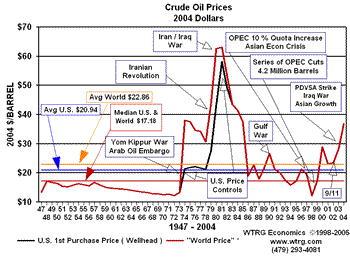 Click on graph for larger view
| ||
| The Very Long Term View The very long-term view is much the same. Since 1869, US crude oil prices adjusted for inflation have averaged $22.52 per barrel in 2008 dollars compared to $23.42 for world oil prices. Fifty percent of the time prices U.S. and world prices were below the median oil price of $16.71 per barrel. If long-term history is a guide, those in the upstream segment of the crude oil industry should structure their business to be able to operate with a profit, below $17.65 per barrel half of the time. The very long-term data and the post World War II data suggest a "normal" price far below the current price. | 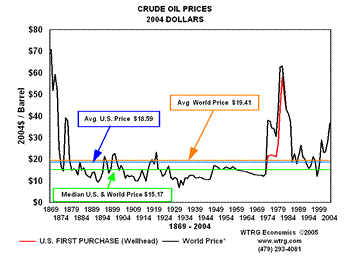 Click on graph for larger view | Would you like to advertise on WTRG.com? WTRG recieves over 1 million pageviews per month on average. Email us HERE to find out how! | |
The results are dramatically different if only post-1970 data are used. In that case, U.S. crude oil prices average $32.36 per barrel and the more relevant world oil price averages $35.50 per barrel. The median oil price for that period is $30.04 per barrel. If oil prices revert to the mean this period is likely the most appropriate for today's analyst. It follows the peak in U.S. oil production eliminating the effects of the Texas Railroad Commission and is a period when the Seven Sisters were no longer able to dominate oil production and prices. It is an era of far more influence by OPEC oil producers than they had in the past. As we will see in the details below influence over oil prices is not equivalent to control. | Crude Oil Prices 1970-2008 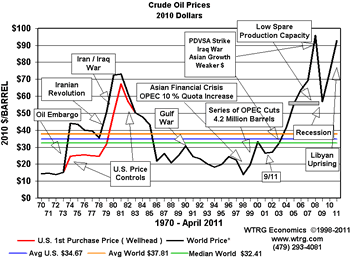 Click on graph for larger view | ||
| Post World War II Pre Embargo Period Crude Oil prices ranged between $2.50 and $3.00 from 1948 through the end of the 1960s. The price oil rose from $2.50 in 1948 to about $3.00 in 1957. When viewed in 2008 dollars an entirely different story emerges with crude oil prices fluctuating between $17 and $19 during most of the period. The apparent 20% price increase in nominal prices just kept up with inflation.From 1958 to 1970, prices were stable near $3.00 per barrel, but in real terms the price of crude oil declined from above $19 to $14 per barrel. The decline in the price of crude when adjusted for inflation for the international producer suffered the additional effect in 1971 and 1972 of a weaker US dollar. Established in 1960 OPEC, with five founding members Iran, Iraq, Kuwait, Saudi Arabia and Venezuela, took over a decade to establish its influence in the world market. Two of the representatives at the initial meetings had studied the the Texas Railroad Commission's methods of influencing price through limitations on production. By the end of 1971, six other nations had joined the group: Qatar, Indonesia, Libya, United Arab Emirates, Algeria and Nigeria. From the foundation of the Organization of Petroleum Exporting Countries through 1972 member countries experienced steady decline in the purchasing power of a barrel of oil. Throughout the post war period exporting countries found increasing demand for their crude oil but a 40% decline in the purchasing power of a barrel of oil. In March 1971, the balance of power shifted. That month the Texas Railroad Commission set proration at 100 percent for the first time. This meant that Texas producers were no longer limited in the volume of oil that they could produce. More importantly, it meant that the power to control crude oil prices shifted from the United States (Texas, Oklahoma and Louisiana) to OPEC. Another way to say it is that there was no more spare capacity in the U.S. and therefore no tool to put an upper limit on prices. A little over two years later OPEC, through the unintended consequence of war, obtained a glimpse of the extent of its power to influence prices. |
| ||
| Middle East Supply Interruptions Yom Kippur War - Arab Oil Embargo In 1972, the price of crude oil was about $3.00 per barrel. By the end of 1974, the price of oil had quadrupled to over $12.00. The Yom Kippur War started with an attack on Israel by Syria and Egypt on October 5, 1973. The United States and many countries in the western world showed support for Israel. Because of this support, several Arab exporting nations and Iran imposed an embargo on the countries supporting Israel. While these nations curtailed production by 5 million barrels per day other countries were able to increase production by a million barrels. The net loss of 4 million barrels per day extended through March of 1974 and represented 7 percent of the free world production.Any doubt the ability to control crude oil prices had passed from the United States to OPEC was removed during the Arab Oil Embargo. The extreme sensitivity of prices to supply shortages became all too apparent when prices increased 400 percent in six short months. From 1974 to 1978, the world crude oil price was relatively flat ranging from $12.21 per barrel to $13.55 per barrel. When adjusted for inflation world oil prices were in a period of moderate decline. | U.S. and World Events and Oil Prices 1973-1981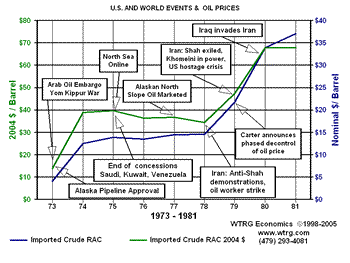 Click on graph for larger view OPEC Oil Production 1973-2009 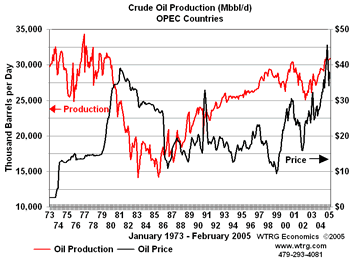 Click on graph for larger view | ||
Crises in Iran and Iraq In 1979 and 1980, events in Iran and Iraq led to another round of crude oil price increases. The Iranian revolution resulted in the loss of 2 to 2.5 million barrels per day of oil production between November 1978 and June 1979. At one point production almost halted.The Iranian revolution was the proximate cause of what would become the highest price in post-WWII history. However, its impact on prices would have been limited and of relatively short duration had it not been for subsequent events. Shortly after the revolution, production was up to 4 million barrels per day. In September 1980, Iran already weakened by the revolution was invaded by Iraq. By November, the combined production of both countries was only a million barrels per day and 6.5 million barrels per day less than a year before. Consequently worldwide crude oil production was 10 percent lower than in 1979. The combination of the Iranian revolution and the Iraq-Iran War cause crude oil prices to more than double increasing from $14 in 1978 to $35 per barrel in 1981. Three decades later Iran's production is only two-thirds of the level reached under the government of Reza Pahlavi, the former Shah of Iran. Iraq's production remains a million barrels below its peak before the Iraq-Iran War. | Iran Oil production 1973-2009 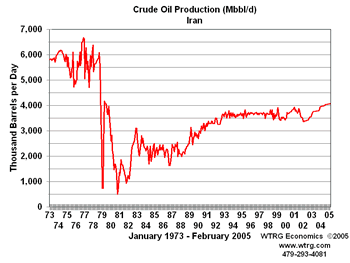 Click on graph for larger view Iraq Oil production 1973-2009 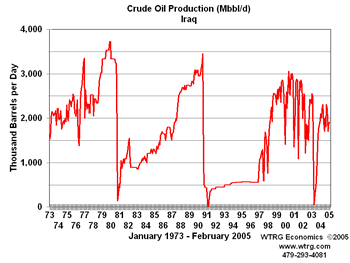 Click on graph for larger view | ||
US Oil Price Controls - Bad Policy? The rapid increase in crude prices from 1973 to 1981 would have been much less were it not for United States energy policy during the post Embargo period. The US imposed price controls on domestically produced oil. The obvious result of the price controls was that U.S. consumers of crude oil paid about 50 percent more for imports than domestic production and U.S producers received less than world market price. In effect, the domestic petroleum industry was subsidizing the U.S. consumer. Did the policy achieve its goal? In the short-term, the recession induced by the 1973-1974 crude oil price spike was somewhat less severe because U.S. consumers faced lower prices than the rest of the world. However, it had other effects as well. In the absence of price controls, U.S. exploration and production would certainly have been significantly greater. Higher petroleum prices faced by consumers would have resulted in lower rates of consumption: automobiles would have achieved higher miles per gallon sooner, homes and commercial buildings would have has better insulated and improvements in industrial energy efficiency would have been greater than they were during this period. Consequently, the United States would have been less dependent on imports in 1979-1980 and the price increase in response to Iranian and Iraqi supply interruptions would have been significantly less. | US Oil Price Controls 1973-1981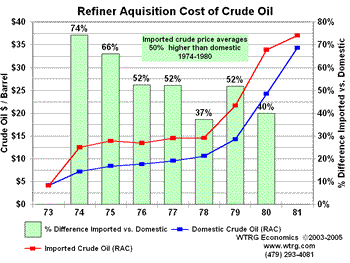 Click on graph for larger view | ||
| OPEC Fails to Control Crude Oil Prices | |||
OPEC has seldom been effective at controlling prices. While often referred to as a cartel, OPEC does not satisfy the definition. One of the primary requirements is a mechanism to enforce member quotas. The old joke went something like this. What is the difference between OPEC and the Texas Railroad Commission? OPEC doesn't have any Texas Rangers! The only enforcement mechanism that has ever existed in OPEC was Saudi spare capacity. With enough spare capacity at times to be able to increase production sufficiently to offset the impact of lower prices on its own revenue, Saudi Arabia could enforce discipline by threatening to increase production enough to crash prices. In reality even this was not an OPEC enforcement mechanism unless OPEC's goals coincided with those of Saudi Arabia. During the 1979-1980 period of rapidly increasing prices, Saudi Arabia's oil minister Ahmed Yamani repeatedly warned other members of OPEC that high prices would lead to a reduction in demand. His warnings fell on deaf ears. Surging prices caused several reactions among consumers: better insulation in new homes, increased insulation in many older homes, more energy efficiency in industrial processes, and automobiles with higher efficiency. These factors along with a global recession caused a reduction in demand which led to falling crude prices. Unfortunately for OPEC only the global recession was temporary. Nobody rushed to remove insulation from their homes or to replace energy efficient plants and equipment -- much of the reaction to the oil price increase of the end of the decade was permanent and would never respond to lower prices with increased consumption of oil. Higher prices also resulted in increased exploration and production outside of OPEC. From 1980 to 1986 non-OPEC production increased 10 million barrels per day. OPEC was faced with lower demand and higher supply from outside the organization. From 1982 to 1985, OPEC attempted to set production quotas low enough to stabilize prices. These attempts met with repeated failure as various members of OPEC produced beyond their quotas. During most of this period Saudi Arabia acted as the swing producer cutting its production in an attempt to stem the free fall in prices. In August of 1985, the Saudis tired of this role. They linked their oil price to the spot market for crude and by early 1986 increased production from 2 MMBPD to 5 MMBPD. Crude oil prices plummeted below $10 per barrel by mid-1986. Despite the fall in prices Saudi revenue remained about the same with higher volumes compensating for lower prices. A December 1986 OPEC price accord set to target $18 per barrel bit it was already breaking down by January of 1987and prices remained weak. The price of crude oil spiked in 1990 with the lower production and uncertainty associated with the Iraqi invasion of Kuwait and the ensuing Gulf War. The world and particularly the Middle East had a much harsher view of Saddam Hussein invading Arab Kuwait than they did Persian Iran. The proximity to the world's largest oil producer helped to shape the reaction. Following what became known as the Gulf War to liberate Kuwait crude oil prices entered a period of steady decline until in 1994 inflation adjusted prices attained their lowest level since 1973. The price cycle then turned up. The United States economy was strong and the Asian Pacific region was booming. From 1990 to 1997 world oil consumption increased 6.2 million barrels per day. Asian consumption accounted for all but 300,000 barrels per day of that gain and contributed to a price recovery that extended into 1997. Declining Russian production contributed to the price recovery. Between 1990 and 1996 Russian production declined over 5 million barrels per day. | 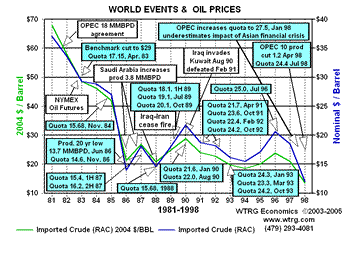 Click on graph for larger view U.S. Petroleum Consumption
Russian Crude Oil Production 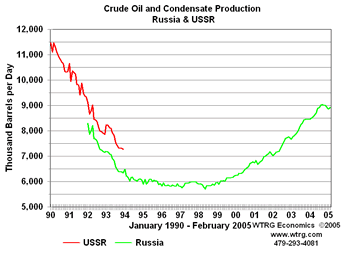 Click on graph for larger view | ||
| OPEC continued to have mixed success in controlling prices. There were mistakes in timing of quota changes as well as the usual problems in maintaining production discipline among its member countries. The price increases came to a rapid end in 1997 and 1998 when the impact of the economic crisis in Asia was either ignored or severely underestimated by OPEC. In December, 1997 OPEC increased its quota by 2.5 million barrels per day (10 percent) to 27.5 MMBPD effective January 1, 1998. The rapid growth in Asian economies had come to a halt. In 1998 Asian Pacific oil consumption declined for the first time since 1982. The combination of lower consumption and higher OPEC production sent prices into a downward spiral. In response, OPEC cut quotas by 1.25 million b/d in April and another 1.335 million in July. Price continued down through December 1998. Prices began to recover in early 1999 and OPEC reduced production another 1.719 million barrels in April. As usual not all of the quotas were observed but between early 1998 and the middle of 1999 OPEC production dropped by about 3 million barrels per day and was sufficient to move prices above $25 per barrel. With minimal Y2K problems and growing US and world economies the price continued to rise throughout 2000 to a post 1981 high. Between April and October, 2000 three successive OPEC quota increases totaling 3.2 million barrels per day were not able to stem the price increases. Prices finally started down following another quota increase of 500,000 effective November 1, 2000. | 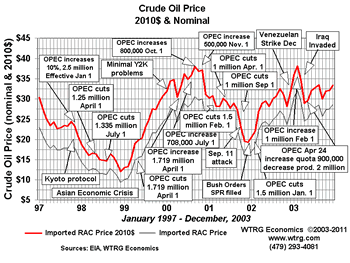 OPEC Production 1990-2007 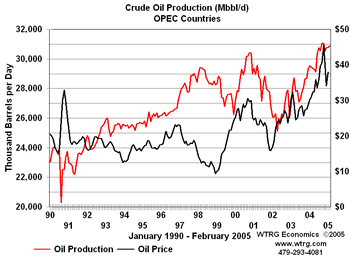 | ||
| Russian production increases dominated non-OPEC production growth from 2000 forward and was responsible for most of the non-OPEC increase since the turn of the century. Once again it appeared that OPEC overshot the mark. In 2001, a weakened US economy and increases in non-OPEC production put downward pressure on prices. In response OPEC once again entered into a series of reductions in member quotas cutting 3.5 million barrels by September 1, 2001. In the absence of the September 11, 2001 terrorist attack this would have been sufficient to moderate or even reverse the trend. In the wake of the attack crude oil prices plummeted. Spot prices for the U.S. benchmark West Texas Intermediate were down 35 percent by the middle of November. Under normal circumstances a drop in price of this magnitude would have resulted an another round of quota reductions but given the political climate OPEC delayed additional cuts until January 2002. It then reduced its quota by 1.5 million barrels per day and was joined by several non-OPEC producers including Russia who promised combined production cuts of an additional 462,500 barrels. This had the desired effect with oil prices moving into the $25 range by March, 2002. By mid-year the non-OPEC members were restoring their production cuts but prices continued to rise and U.S. inventories reached a 20-year low later in the year. By year end oversupply was not a problem. Problems in Venezuela led to a strike at PDVSA causing Venezuelan production to plummet. In the wake of the strike Venezuela was never able to restore capacity to its previous level and is still about 900,000 barrels per day below its peak capacity of 3.5 million barrels per day. OPEC increased quotas by 2.8 million barrels per day in January and February, 2003. On March 19, 2003, just as some Venezuelan production was beginning to return, military action commenced in Iraq. Meanwhile, inventories remained low in the U.S. and other OECD countries. With an improving economy U.S. demand was increasing and Asian demand for crude oil was growing at a rapid pace. The loss of production capacity in Iraq and Venezuela combined with increased OPEC production to meet growing international demand led to the erosion of excess oil production capacity. In mid 2002, there was over 6 million barrels per day of excess production capacity and by mid-2003 the excess was below 2 million. During much of 2004 and 2005 the spare capacity to produce oil was under a million barrels per day. A million barrels per day is not enough spare capacity to cover an interruption of supply from most OPEC producers. In a world that consumes over 80 million barrels per day of petroleum products that added a significant risk premium to crude oil price and is largely responsible for prices in excess of $40-$50 per barrel. Other major factors contributing to the current level of prices include a weak dollar and the continued rapid growth in Asian economies and their petroleum consumption. The 2005 hurricanes and U.S. refinery problems associated with the conversion from MTBE as an additive to ethanol have contributed to higher prices. | 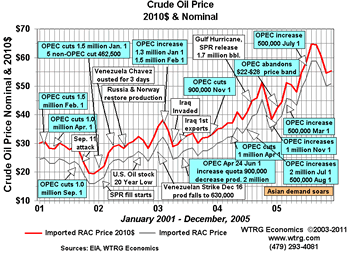 Russian Crude Oil Production  Venezuelan Oil Production 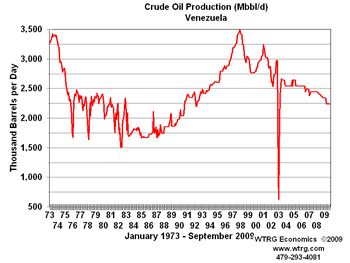 Click on graph for larger view Excess Crude Oil Production Capacity 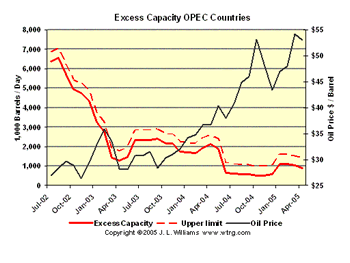 | ||
| One of the most important factors supporting a high price is the level of petroleum inventories in the U.S. and other consuming countries. Until spare capacity became an issue inventory levels provided an excellent tool for short-term price forecasts. Although not well publicized OPEC has for several years depended on a policy that amounts to world inventory management. Its primary reason for cutting back on production in November, 2006 and again in February, 2007 was concern about growing OECD inventories. Their focus is on total petroleum inventories including crude oil and petroleum products, which are a better indicator of prices that oil inventories alone. | 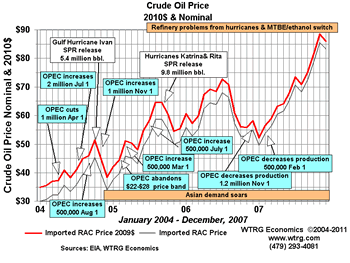 | ||
| Impact of Prices on Industry Segments Drilling and Exploration | |||
| Boom and Bust The Rotary Rig Count is the average number of drilling rigs actively exploring for oil and gas. Drilling an oil or gas well is a capital investment in the expectation of returns from the production and sale of crude oil or natural gas. Rig count is one of the primary measures of the health of the exploration segment of the oil and gas industry. In a very real sense it is a measure of the oil and gas industry's confidence in its own future. At the end of the Arab Oil Embargo in 1974 rig count was below 1500. It rose steadily with regulated crude oil prices to over 2000 in 1979. From 1978 to the beginning of 1981 domestic crude oil prices exploded from a combination of the the rapid growth in world energy prices and deregulation of domestic prices. At that time high prices and forecasts of crude oil prices in excess of $100 per barrel fueled a drilling frenzy. By 1982 the number of rotary rigs running had more than doubled. It is important to note that the peak in drilling occurred over a year after oil prices had entered a steep decline which continued until the 1986 price collapse. The one year lag between crude prices and rig count disappeared in the 1986 price collapse. For the next few years the economy of the towns and cities in the oil patch was characterized by bankruptcy, bank failures and high unemployment. | U.S. Rotary Rig Count 1974-2005 Crude Oil and Natural Gas Drilling 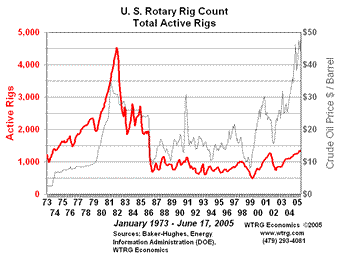 Click on graph for larger view | ||
| After the Collapse Several trends established were established in the wake of the collapse in crude prices. The lag of over a year for drilling to respond to crude prices is now reduced to a matter of months. (Note that the graph on the right is limited to rigs involved in exploration for crude oil as compared to the previous graph which also included rigs involved in gas exploration.) Like any other industry that goes through hard times the oil business emerged smarter, leaner and more conservative. Industry participants, bankers and investors were far more aware of the risk of price movements. Companies long familiar with accessing geologic, production and management risk added price risk to their decision criteria. Technological improvements were incorporated:
| U.S. Rotary Rig Count Exploration for Oil 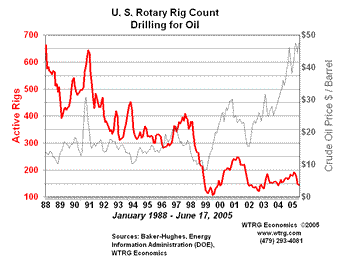 Click on graph for larger view U.S. Rotary Rig Count | ||
| Well Completions - A measure of success? Rig count does not tell the whole story of oil and gas exploration and development. It is certainly a good measure of activity, but it is not a measure of success. After a well is drilled it is either classified as an oil well, natural gas well or dry hole. The percentage of wells completed as oil or gas wells is frequently used as a measure of success. In fact, this percentage is often referred to as the success rate. Immediately after World War II 65 percent of the wells drilled were completed as oil or gas wells. This percentage declined to about 57 percent by the end of the 1960s. It rose steadily during the 1970s to reach 70 percent at the end of that decade. This was followed by a plateau or modest decline through most of the 1980s. Beginning in 1990 shortly after the harsh lessons of the price collapse completion rates increased dramatically to 77 percent. What was the reason for the dramatic increase? For that matter, what was the cause of the steady drop in the 1950s and 1960s or the reversal in the 1970s? Since the percentage completion rates are much lower for the more risky exploratory wells, a shift in emphasis away from development would result in lower overall completion rates. This, however, was not the case. An examination of completion rates for development and exploratory wells shows the same general pattern. The decline was price related as we will explain later. Some would argue that the periods of decline were a result of the fact that every year there is less oil to find. If the industry does not develop better technology and expertise every year, oil and gas completion rates should decline. However, this does will not explain the periods of increase. The increases of the seventies were more related to price than technology. When a well is drilled, the fact that oil or gas is found does not mean that the well will be completed as a producing well. The determining factor is economics. If the well can produce enough oil or gas to cover the additional cost of completion and the ongoing production costs it will be put into production. Otherwise, its a dry hole even if crude oil or natural gas is found. The conclusion is that if real prices are increasing we can expect a higher percentage of successful wells. Conversely if prices are declining the opposite is true. The increases of the 1990s, however, cannot be explained by higher prices. These increases are the result of improved technology and the shift to a higher percentage of natural gas drilling activity. The increased use of and improvements to 3-D seismic data and analysis combined with horizontal and and directional drilling improve prospects for successful completions. The fact that natural gas is easier to see in the seismic data adds to that success rate. Most dramatic is the improvement in the the percentage exploratory wells completed. In the 1990s completion rates for exploratory wells have soared from 25 to 45 percent. | Oil and Gas Well Completion Rates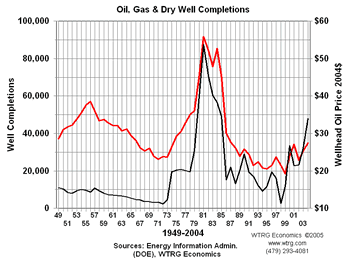 Click on graph for larger view Oil and Gas Well Completion Rates 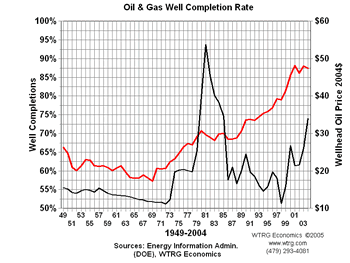 Click on graph for larger view Oil and Gas Well Completion Rates U.S. Oil and Gas Well Completion Rates | ||
Workover Rigs - Maintenance Workover rig count is a measure of the industry's investment in the maintenance of oil and gas wells. The Baker-Hughes workover rig count includes rigs involved in pulling production tubing, sucker rods and pumps from a well that is 1,500 feet or more in depth. A low level of workover activity is particularly worrisome because it is indicative of deferred maintenance. The situation is similar to the aging apartment building that no longer justifies major renovations and is milked as long as it produces a positive cash flow. When operators are in a weak cash position workovers are delayed as long as possible. Workover activity impacts manufacturers of tubing, rods and pumps. Service companies coating pipe and other tubular goods are heavily affected. | U.S. Workover Rigs and Crude Oil Prices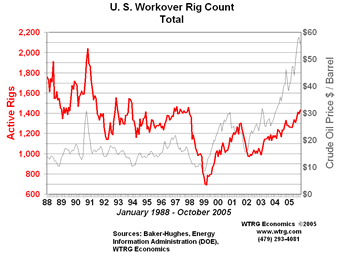 Click on graph for la | ||
Cabinet okays GoM measures on BhopalTimes of India - 20 hours ago NEW DELHI: The Union Cabinet on Thursday approved enhanced compensation for Bhopal gas leak victims and agreed to make fresh efforts to seek extradition of ex-Union Carbide chief Warren Anderson and for restoration of a stronger case against the ... Government may review Bhopal case settlementThe Hindu - - 18 hours ago The United Progressive Alliance government will explore whether the $470-million out-of-court settlement, arrived at between India and Union Carbide in 1989 in the Bhopal gas leak case, can be reviewed in the light of evidence that emerged in the ... As Law Minister, Jaitley felt Anderson case was weakThe Hindu - - Jun 23, 2010 NEW DELHI: Today his party is baying for blood, demanding that the government secure the extradition of the former Union Carbide chairman, Warren Anderson, to India for trial. However, when he was Law Minister a decade ago, BJP leader Arun Jaitley ...
Govt. released Union Carbide from civil liability in 1989: DowThe Hindu - Jun 23, 2010 PTI These differently-abled children at JP Nagar in Bhopal, Vikas Yadav (11) and Aman Yadav (9), had to suffer the consequences of India's worst industrial disaster of 1984. Photo: AM Faruqui The Dow Chemical Company, which owns Union Carbide ... Compensation offered is meagre, says CPI(M)The Hindu - Jun 22, 2010 The Communist Party of India (Marxist) on Tuesday punched holes into the recommendations of the Group of Ministers (GoM) on the Bhopal gas leak, stating that the "meagre" compensation was based on a flawed estimation of deaths and injuries and that ... No official records of Anderson visit: GoMThe Hindu - - 17 hours ago NEW DELHI: The Central government has denied any official knowledge of the visit of the then Union Carbide chairman, Warren Anderson, to India immediately after the Bhopal gas leak disaster since "the immigration/emigration records of 1984 are not ... Gas victims protest new relief normsTimes of India - 16 hours ago NEW DELHI: The victims of Bhopal gas tragedy gathered near Jantar Mantar in central Delhi on Thursday to protest against the government's new compensation package. The protesters say that only a few people will get the relief as per the government's ... GoM has failed to hold Dow's feet to the fireRediff - 18 minutes ago The entire effort to artificially bury the Bhopal legacy is misguided. Unfortunately, the legacy lives on. Justice demands that it is brought to an honourable, dignified closure in a fair and transparent manner. The Group of Ministers has failed to do ... India to try to extradite ex-Union Carbide headThe Associated Press - 9 hours ago NEW DELHI — India's Cabinet has approved pushing for the former head of Union Carbide to be extradited over the toxic gas leak in 1984 that killed an estimated 15000 people. Public ire over the world's worst industrial disaster in the Indian city of ... Bhopal GoM finalises agenda for next meetingThe Hindu - - 18 hours ago Dow Chemical's collaboration with Reliance, a memorial for the victims, and legal measures to prevent a repeat of disasters like the Bhopal gas leak are among the issues that will be discussed by the Group of Ministers at its next meeting. ... | Timeline of articles Number of sources covering this story
|
| |||||||||||||
Interviews
| |||||||||||||
NRI Solutions New | |||||||||||||
| |||||||||||||
Jobs/careers  Indians most ambitious, mobile workers: Study Indians most ambitious, mobile workers: StudyIndians are the most willing to switch jobs than their peers in other parts of the world. | |||||||||||||
ET Slide Shows
| |||||||||||||
Environment
| |||||||||||||
ET Headline Petrol price up by Rs 3.73/L, diesel by Rs 2/L 25 Jun 2010, 1513 hrs IST,AGENCIES
| |||||||||||||||||||
1345 hrs IST 1127 hrs IST 0406 hrs IST 0223 hrs IST 0253 hrs IST 0339 hrs IST 1032 hrs IST 0304 hrs IST 0148 hrs IST | |||||||||||||||||||
Britain to soon announce curbs on immigration
British govt has announced to impose an annual cap on number of skilled pros who could come to Britain for work. US cities, cos team up on immigration reform | |||||||||||||||||||
Sending CV via email? Here is what you should avoid
The cover letter should be precise, properly addressed and written with right capitalisation and zero grammatical mistakes. Tips to bag desired paycheck | |||||||||||||||||||
| All headlines >> | |||||||||||||||||||
| |||||||||||||||||||
| |||||||||||||||||||
Politics / Nation
| Opinion
| ||||||||||||||||||
| |||||||||||||||||||
| ||||||||||||||||||||
| ||||||||||||||||||||
Commodities  'Impose duty on imported sugar' 'Impose duty on imported sugar'Karnataka sugar mill owners are seeking imposition of duty on imported sugar. | ||||||||||||||||||||
| ||||||||||||||||||||
Smart Living | ||||||||||||||||||||
ET on mobile | ||||||||||||||||||||
ePaper: Print Edition  Get the replica of your favourite edition of Economic Times Feel at home.. | ||||||||||||||||||||
| ||||||||||||||||||||
Zigwheels New | ||||||||||||||||||||
| Online food guides at timescity.com | ||||||||||||||||||||
| Powered by Indiatimes |
Markets
| BSE Sensex | 17,574.53 | -155.71 | -0.88% |
| Nifty 50 | 5,269.05 | -51.55 | -0.97% |
| Nikkei 225 | 9,737.48 | -190.86 | -1.92% |
| Hang Seng | 20,690.79 | -42.70 | -0.21% |
Market Update
Fri, Jun 25 - 5:13PM IST
Selling pressure across the selective pivotal led the domestic bourses to close the day s trade on negative note. Since the initial bell, the domestic markets witnessed significant losses on the back ...
Market Movers
| Company | Price | Change | % Change | |
|---|---|---|---|---|
| Most Active | more | |||
| RNRL.BO | 65.95 | +2.10 | +3.29% | RIL NAT RES |
| GTLINFRA.B | 42.85 | 0.00 | 0.00% | GTL INFRAST |
| Top Gainers | more | |||
| ASIANTNE.B | 36.30 | +6.05 | +20.00% | ASIAN TEA EX(BSE INDONEXT) |
| ZENITH.BO | 28.95 | +4.80 | +19.88% | ZENITH BIRLA (BSE INDONEXT) |
| Top Losers | more | |||
| PHOENXIN.B | 22.85 | -2.50 | -9.86% | PHOENIX INTE |
| MAVENSBIO. | 36.60 | -3.85 | -9.52% | MAVENS BIO |
| Company | Price | Change | % Change | |
|---|---|---|---|---|
| Most Active | more | |||
| RNRL.NS | 65.95 | +2.00 | +3.13% |  |
| GTLINFRA.N | 45.35 | +2.55 | +5.96% | GTL Infrastructure Limite  |
| Top Gainers | more | |||
| JAYAGRO_a. | 125.00 | +45.40 | +57.04% | JAYANT AGRO ORGANICS LTD |
| RANEENG_a. | 323.00 | +109.00 | +50.93% | RANE ENG VALVE LTD  |
| Top Losers | more | |||
| PANORAM_a. | 30.00 | -8.90 | -22.88% |  |
| KITPLYI_a. | 9.45 | -2.40 | -20.25% | KITPLY INDUSTRIES LTD |
Top Stories
As of 7 hours ago
Possible outcomes for fuel price reforms
- ReutersThe government on Friday will once again grapple with the political hot potato of deregulating fuel prices, seeking a way to improve its financial health as it tries to shield its 1.2 billion citizens from high prices....
Featured
The mutual fund regulator, Securities and Exchange Board of India (Sebi), is agreeable that Amfi mus take responsibility in its own hands by draftig a policy paper.
- Report: MFs heave a sigh of relief
- Report: Ulips to turn long-term investments
LIVE BUSINESS NEWS
- Govt raises monsoon f'cast; may ease food prices- Reuters
- Rupee up as RBI's rate move watched- Reuters
- Fuel price rises add rate hike pressure- Reuters
- Reliance Industries, Reliance Natural sign revised gas pact- Reuters
- Provogue arm to develop 300,000 sq feet in Aurangabad- Reuters
- Private oil firms may start retail outlets again: secy- Reuters
- GLOBAL MARKETS - Economic worry, G20 jitters reign- Reuters
- Govt working on MVNO guidelines - telecom secy- Reuters
- BSE Sensex drops; Reliance Indus up, state oil cos jump- Reuters
- Fuel price hike to push up inflation - adviser- Reuters
| BSE SENSEX | 17,574.53 | -155.71 | -0.88% |
| S&P CNX NIFTY | 5,269.05 | -51.55 | -0.97% |
| |
Quotes
Symbol LookupMessage Board
| Topics | Replies | |
|---|---|---|
| 1 | Easily Earn $ 500 to $10,000 Monthly from Home by earnings555 [22 second(s) ago] | 0 |
| 2 | Easily Earn $ 500 to $10,000 Monthly from Home by earnings555 [22 second(s) ago] | 0 |
| 3 | Easily Earn $ 500 to $10,000 Monthly from Home by earnings555 [22 second(s) ago] | 0 |












































































































































 Printer Friendly
Printer Friendly Subscribe
Subscribe

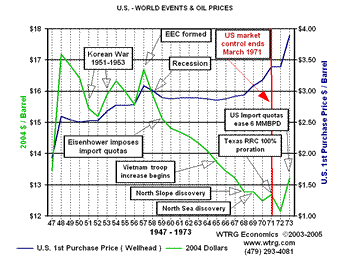
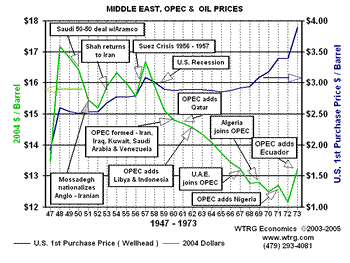
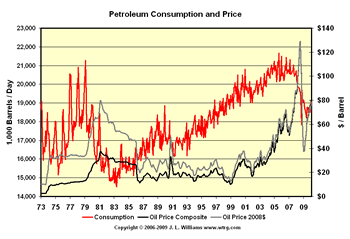
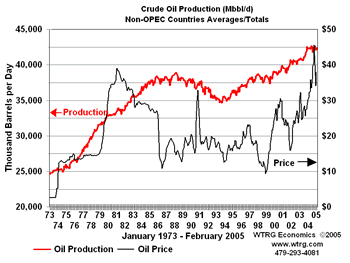
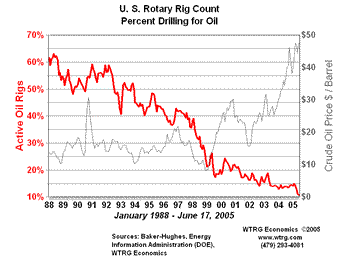
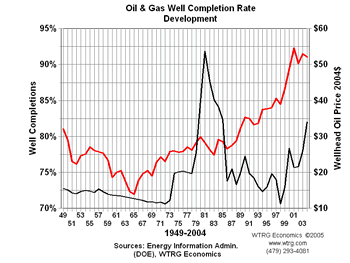
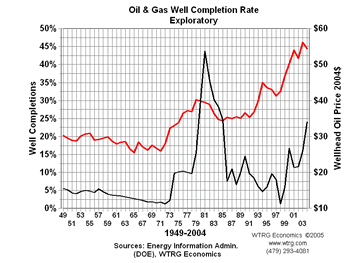





 ET SlideShow
ET SlideShow













 News, Business, Stocks & more via 58888
News, Business, Stocks & more via 58888
No comments:
Post a Comment